NEBRASKA MUNICIPAL REVIEW NEBRASKA MUNICIPAL REVIEW

Poppies on the prairie in Kearney
Local control, leadership, and the art of compromise: MWC recap
Official Publication of the League of Nebraska Municipalities
Going green - Solar has big impact in Wahoo MARCH 2024

NEBRASKA MUNICIPAL REVIEW
Contents
MARCH 2024
No. 1,187
ISSN 0028–1906
About the Cover:
In October 2023, several 14-foot poppies were installed in Yanney Park in Kearney. The flowers, created by Placzek Studios, are constructed of hand-painted metal and poly-carbonate with LED lighting. Photo provided courtesy of the Yanney Heritage Park Foundation.
4
Larger Cities Legislative Committee
Seth Sorensen, City Manager, Alliance
Tobias Tempelmeyer, City Administrator/General Manager, Beatrice
Rusty Hike, Mayor, Bellevue
Jim Ristow, City Administrator, Bellevue
Mindy Rump, Mayor, Blair
Phil Green, City Administrator, Blair
Desirae Solomon, City Attorney, Blair
Miles Bannon, Council Member, Chadron
Tom Menke, City Manager, Chadron
Jim Bulkley, Mayor, Columbus
Tara Vasicek, City Administrator, Columbus
Dave Bauer, Mayor Crete
Tom Ourada, City Administrator, Crete
Joey Spellerberg, Mayor, Fremont
Jody Sanders, City Administrator, Fremont
Kent Ewing, Mayor, Gering
Laura McAloon, City Administrator, Grand Island
Mike Evans, Mayor, Gretna
Paula Dennison, City Administrator, Gretna
Corey Stutte, Mayor, Hastings
Shawn Metcalf, City Administrator, Hastings
James Liffrig, Mayor, Holdrege
The Director’s Message by L. Lynn Rex, LNM Executive Director – EPIC OPTION: Tax Foundation Study agrees with analysis by ITEP that a consumption tax rate of over 21% would be necessary to fund state and local governments!
Poppies on the prairie – brightly-colored flowers have blossomed in Kearney
Local control, leadership, and the art of compromise - Wide variety of topics covered at the League’s Annual Midwinter Conference
Going green – Wahoo powers a win, win, win with new solar plant that has a library twist
Local leaders attend Congressional City Conference in Washington D.C
USDA RD: Celebrating quality water in central Nebraska
The Commentary: Be prepared! Make sure you have your photo ID ready to vote in the May election – Sec. of State Bob Evnen
Center for Rural Affairs: Resources available to address communities’ environmental and energy challenges
LARM: Breaking it down – The cost of an injured worker … and how to create a culture of safety in your municipality
Social media for municipal government: Read the comments, but with care and a plan
The Legal Corner: Adjusting performance expectations for employees on FMLA leave
Professional Directory
Hastings Municipal Airport named airport of the year by Nebraska Aeronautics Commission
Chris Rector, City Administrator, Holdrege
Stan Clouse, Mayor, Kearney
Brenda Jensen, City Manager, Kearney
Doug Kindig, Mayor, La Vista
Pam Buethe, Clerk, La Vista
John Fagot, Mayor, Lexington
Joe Pepplitsch, City Manager, Lexington
Margaret Blatchford, Assistant City Attorney, Lincoln
Amanda Barker, Advisor to the Mayor, Lincoln
Linda Taylor, Mayor, McCook
Nate Schneider, City Manager, McCook
Bryan Bequette, Mayor, Nebraska City
Perry Mader, City Administrator, Nebraska City
Josh Moenning, Mayor, Norfolk
Andrew Colvin, City Administrator, Norfolk
Dani Myers-Noelle, City Attorney, Norfolk
Brandon Kelliher Mayor, North Platte
Layne Groseth, City Admin./Utilities Manager, North Platte
Steve Krajewski, Mayor, Ogallala
Kevin Wilkins, City Manager, Ogallala
Thomas Warren, Chief of Staff, Omaha
David Black, Mayor, Papillion
Amber Powers, City Administrator, Papillion
Smaller Cities Legislative Committee
Douglas
Jana
Sandra
David
Mandy
Svec, City Administrator, Geneva
Deb VanMatre, Mayor, Gibbon
Matt Smallcomb, City Administrator, Gibbon
Gary Greer, City Administrator, Gothenburg
Mike Feeken, Mayor, St. Paul
Nancy Bryan, Clerk/Treasurer, Stromsburg
Sandra Foote, Council Member, Superior
Jeff Hofaker, City Administrator, Sutton
R. Paul Lambert, Mayor, Plattsmouth
Emily Bausch, City Administrator, Plattsmouth
Don Groesser, Mayor, Ralston
Brian Kavanaugh, Council Member, Ralston
Rick Hoppe, City Administrator, Ralston
William De Roos, City Administrator, Schuyler
Jeanne McKerrigan, Mayor, Scottsbluff
Jordan Colwell, Vice Mayor, Scottsbluff
Kevin Spencer, City Manager/Police Chief, Scottsbluff
Joshua Eickmeier, Mayor, Seward
Greg Butcher, City Administrator, Seward
Roger Gallaway, Mayor, Sidney
David Scott, City Manager, Sidney
Carol Schuldt, Council Member, South Sioux City
Lance Hedquist, City Administrator, South Sioux City
Cale Giese, Mayor, Wayne
Jill Brodersen, Council President, Wayne
Wes Blecke, City Administrator, Wayne
Barry Redfern, Mayor, York
Dr. Sue Crawford, City Administrator, York
Jessica Meyer, City Administrator, Syracuse
Kyle Arganbright, Mayor, Valentine
Melissa Harrell, City Administrator, Wahoo
Desiree Soloman, City Attorney, Waterloo
Stephanie Fisher, City Administrator, Waverly
Tom Goulette, City Administrator/Utility Superintendent, West Point
Randy Woldt, Utilities Superintendent, Wisner
6
14 16 26 24 30 22 31 28 8 12 18
Jessica Quady, City Administrator, Ashland Marlin Seeman, Mayor, Aurora Eric Melcher, City Administrator, Aurora Chris Anderson, City Administrator, Central City Nikki Schwanz, City Administrator, Cozad Andrew Lee, Admin./Clerk/Treasurer, Curtis Alan Michl, Chairperson, Exeter Becky Erdkamp, Clerk/Treasurer, Exeter Kyle
Huber, Mayor, Hebron
Tietjen, Clerk, Hebron
Oelke, City Administrator, Hickman
K. Schmidt, CMC/Treasurer, Morrill
Kelly
Janine
Schendt, Clerk/Treasurer, Nelson
Director of Government Affairs,
Russell,
NMPP Energy
Hansen, Government Affairs Liason,
Energy
Kruml Clerk/Treasurer, Ord
NMPP
Sandy
Executive Board
2023-2024
President Deb VanMatre Mayor, Gibbon
President-Elect Marlin Seeman Mayor, Aurora
Vice President Bryan Bequette Mayor, Nebraska City
Past President Paul Lambert Mayor, Plattsmouth
Directors
Jean Stothert Mayor, Omaha
Leirion Gaylor
Baird Mayor, Lincoln
Julie A. Deepe Mayor, Deshler
Catherine-Jo
Mills Village Chair, Ansley
Joey Spellerberg Mayor, Fremont
Jordan Colwell Vice Mayor, Scottsbluff
Josh Moenning Mayor, Norfolk
Sharon Powell Village Board President, Utica
Jeff Hofaker City Administrator, Sutton
Janine K. Schmidt CMC/Treasurer, Morrill
Layne Groseth City Administrator/Utilities Manager, North Platte
Affiliated Sections
City Managers Amber Powers Papillion
Clerks Elizabeth Butler Omaha
Municipal Brandi Kloepping
Accounting Cozad
& Finance Fire Chiefs Dennis Thompson North Platte
Utilities Duane Hoffman Oxford
League Staff
L. Lynn Rex Executive Director
Christy Abraham Legal Counsel
Lash Chaffin Utilities Section Director
Cherie DeFreece Administrative Assistant/ Membership Services Assistant
Brenda Henning Membership Services Assistant
Ethan Nguyen LNM/LARM Information Technology Manager
Jackson Sash Utilities Field Representative/ Training Coordinator
Shirley Riley Membership Services Director
Ashley Wolfe Marketing/Communications Director
LARM Staff
Dave Bos Executive Director
Tracy Juranek Assistant Executive Director, Customer Service Specialist
Diane Becker Communications/Marketing Director
Kyla Brockevelt Executive Administrative Assistant
Drew Cook Customer Service Specialist
John Hobbs Loss Control Specialist
James Kelley Loss Control Specialist
Fred Wiebelhaus Loss Control/Claims Manager
CALENDAR
Municipal Legal Calendar
(All statute citations to Revised Statutes of Nebraska)
MAY 2024
CITIES OF THE FIRST CLASS
Within 10 days following meeting or before next meeting
(whichever is sooner) Clerk to have minutes available for public inspection. (84-1413)
Within 15 days of Passage Clerk publishes ordinances passed. (16-405)
Within 30 days following Council meeting Clerk publishes official proceedings of meeting, including claims. (19-1102)
First Day Automatic renewal of beer and liquor licenses (except Class C). (53-124, 53-135)
Within 20 days after end of month Treasurer files monthly financial report. (16-318)
* * ............................................................. Clerk must prepare agenda prior to next Council meeting. (84-1411)
CITIES OF THE SECOND CLASS
Within 10 days following meeting or before next meeting
(whichever is sooner) Clerk to have minutes available for public inspection. (84-1413)
Within 15 days of Passage Clerk publishes or posts ordinances passed. (17-613)
Within 30 days following Council meeting Clerk publishes official proceedings of meeting, including claims. (19-1102)
First Day Automatic renewal of beer and liquor licenses (except Class C).
.................................................................... (53-124,53-135)
Within 20 days after end of month Treasurer files monthly financial report. (17-606)
* * Clerk must prepare agenda prior to next Council meeting. (84-1411)
VILLAGES
Within 10 days following meeting or before next meeting (whichever is sooner) Clerk to have minutes available for public inspection. (84-1413)
Within 15 days of Passage Clerk publishes or posts ordinances passed. (17-613)
Within 30 days following Board meeting Clerk publishes official proceedings of meeting, including claims
.................................................................... (19-1102)
First Day
Automatic renewal of beer and liquor licenses (except Class C). (53-124, 53-135)
Within 20 days after end of month Treasurer files monthly financial report. (17-606)
* * Clerk must prepare agenda prior to next Board meeting. (84-1411)
Nebraska Municipal Review Editor and Advertising Sales: Ashley Wolfe, 402-476-2829 or ashleyw@lonm.org
The NEBRASKA MUNICIPAL REVIEW is the official publication of the League of Nebraska Municipalities, an association of the cities and villages of Nebraska, published at 1335 L St., Lincoln, Nebraska 68508 — Telephone 402-476-2829; FAX 402-476-7052; Website: www.lonm.org. Periodicals postage paid at Lincoln, Nebraska. Views of contributors, solicited or unsolicited, are their own and not to be construed as having the endorsement of the League unless specifically and explicitly stated by the publisher
The NEBRASKA MUNICIPAL REVIEW is a nonprofit publication administered and supervised by the League of Nebraska Municipalities. All revenue derived from the publication is used by the association to defray publication costs.
The NEBRASKA MUNICIPAL REVIEW is published monthly. Subscription rates are $5 per single copy — $50 plus tax for 12 issues.
POSTMASTER: Send address changes to NEBRASKA MUNICIPAL REVIEW, 1335 L Street, Lincoln, Nebraska 68508.
DIRECTOR’S MESSAGE

There are two proposed constitutional amendments being circulated across the state as ballot questions through the initiative process seeking the “Elimination of Property, Income, and Corporate (EPIC)” taxes to impose only a CONSUMPTION TAX to fund state and local governments.
As explained in the November and December 2023 issues of the Review, not only would the “EPIC Option” take away local control over the budgeting process from political subdivisions, but it would require a statewide consumption tax rate over 21% to fund state and local governments! If the EPIC Option would be enacted, Nebraska would be the ONLY state in the United States to abolish the property tax which is the main source of revenue for local governments.
As previously reported in the November Review, OpenSky and the Institute on Taxation and Economic Policy (ITEP) issued an analysis in the fall of 2023 indicating the 7.5% consumption tax rate proponents of EPIC contend would be sufficient to fund state and local governments would result in a $7.4 billion shortfall. The ITEP report indicates a 21.1%
EPIC OPTION: Tax Foundation
Study agrees with analysis by ITEP that a consumption tax rate of over 21% would be necessary to fund state and local governments!
BY L. LYNN REX, EXECUTIVE DIRECTOR, LNM
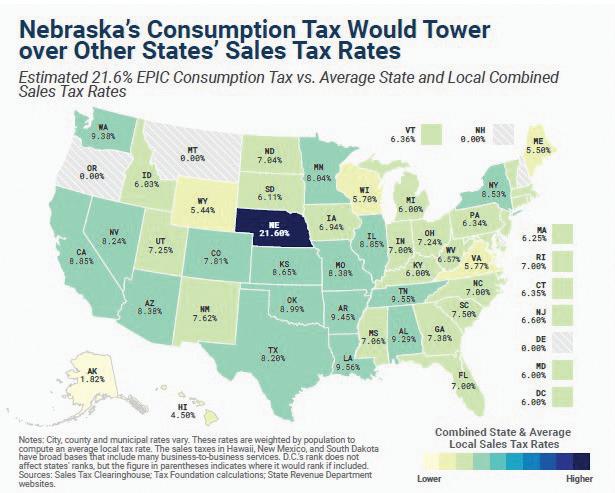
consumption rate would be necessary to adequately fund state and federal governments! At the League’s 2024 Midwinter Conference in February, Dylan Grundman O’Neill, Senior Policy Analyst of ITEP, gave an outstanding presentation with Korby Gilbertson of Radcliffe, Gilbertson and Brady outlining a series of significant concerns about the EPIC Option, including the complete LOSS OF LOCAL CONTROL over the budgeting process for municipalities and other political subdivisions.
The Tax Foundation Study issued in March of 2024 projects the necessary consumption tax rate to be 21.6%: “The EPIC proposal is built on a faulty foundation that could negatively impact Nebraskans and the state’s economy.
4 NEBRASKA MUNICIPAL REVIEW
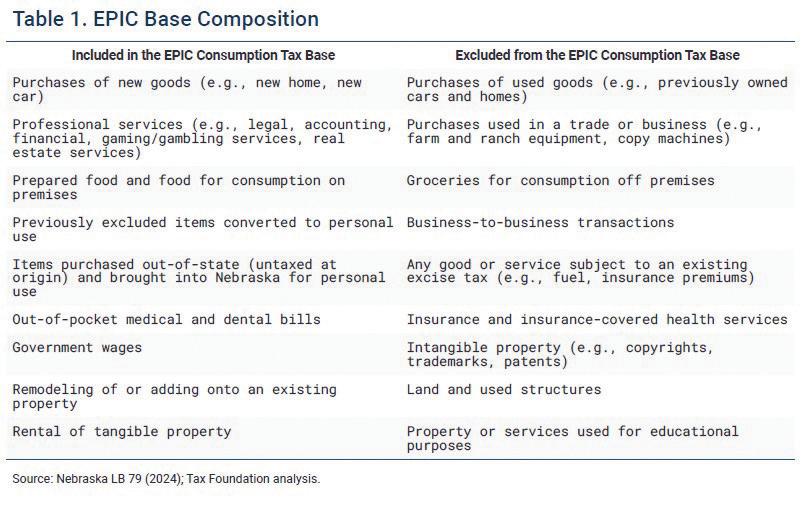
If the EPIC Option were implemented, the progress legislators have made to date on tax competitiveness would be eroded and replaced with an uncompetitive tax code, both regionally and nationally. The proposal’s contemplated consumption tax rate of 7.5% dramatically underfunds state coffers, requiring a rate of over 21% to fund the government at its current levels. That means the legislature will almost immediately be called upon to increase the statewide consumption tax rate, as allowed by statute.”
(The EPIC Option would allow local governments also to enact consumption taxes which would be necessary since the proponent’s projected low 7.5% rate would cause an unprecedented fiscal crisis with the state and local governments losing about twothirds of their existing revenue.)
The EPIC Option calculations anticipate receiving significant revenue from taxing state and local government purchases as well as state and local government compensation. The Tax Foundation Study states: “About $1.7 billion in additional revenue is supposedly generated by TAXING GOVERNMENT CONSUMPTION, SALARIES, AND WAGES, but no adjustment is made to the amount of revenue the new tax needs to replace. Of course, no revenue is truly generated by the government taxing itself: the money goes out one door and in another. But by counting $1.7 billion in additional revenue on one side of the ledger but not recognizing it as having any effects on government balance sheets, proponents further contribute to the artificially low advertised consumption rate.”
Please take time to review the Tax Foundation Study. Another one of the many serious consequences of enacting the EPIC Option would be the loss of out-of-state tourism dollars coupled with the inevitable cross-border shopping by those Nebraskans living close to the border. Nebraskans not living close to a border state would have less opportunity to avoid paying the extraordinary consumption tax of over 21%!
Access the full document from the Tax Foundation below.
The Shortcomings of Nebraska's EPIC Option
By Jared Walczak and Manish Bhatt
https://bit.ly/43CmyMI

Advocacy groups voice opposition to EPIC Tax
See photos from the March 14 press conference on page 30.
5 MARCH 2024
Poppies on the prairie

Brightly-colored flowers have blossomed in Kearney
BY ASHLEY WOLFE, MARKETING & COMMUNICATIONS DIRECTOR, LNM
Although some might call winter in Nebraska a bit bleak, chances are visitors to Yanney Heritage Park in Kearney would disagree. Last October, thanks to a tremendous public-private partnership, multiple 14-foot poppies appeared to help brighten up the landscape.
The brightly colored flowers are the work of Placzek Studios and are constructed of hand-painted metal and poly-carbonate with LED lighting. The poppies are coated in a weather-resistant paint and are built to withstand the weather in the Midwest. And while the daytime experience is wonderful, Kearney residents say the real treat is when the poppies are illuminated in the evening and brilliant crimson red lights up the night sky.
According to the Yanney Heritage Park Foundation website, Yanney Park is a unique venture, born of a meeting between Michael B. Yanney, a Kearney-native, and city park officials in 1998. According to the Yanney Park Foundation website, Mr. Yanney had strong philanthropic values and wanted to do something special for the families who call Kearney home. The acquisition of 80 acres of land in southwest Kearney was made and the park was named in honor of Mr. Yanney’s parents, E.K. and Mary Yanney.
Continued on page 20 / See Poppies
NEBRASKA MUNICIPAL REVIEW
NEBRASKA MUNICPAL REVIEW 6


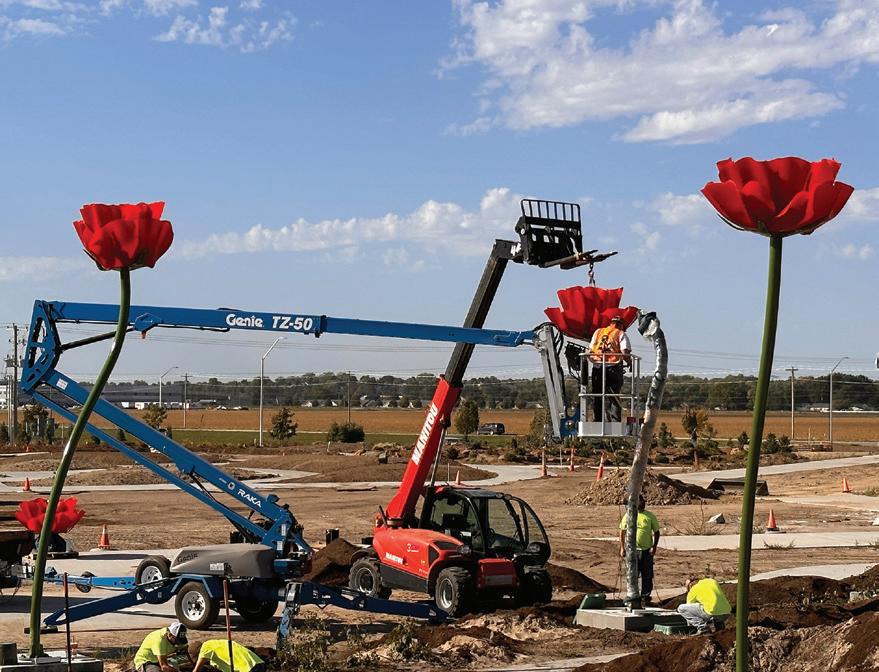

7 MARCH 2024
In October 2023, multiple 14-foot poppies appeared in Yanney Park. This new installation of brightly colored flowers was part of a public-private partnership. The flowers, created by Placzek Studios, are constructed of hand-painted metal and poly-carbonate with LED lighting. Photos provided courtesy of the Yanney Heritage Park Foundation.
Local control, leadership, & the art of compromise
Wide variety of topics covered at the League's Annual Midwinter Conference
PHOTOS AND STORY BY ASHLEY WOLFE, MARKETING & COMMUNICATIONS DIRECTOR, LNM
More than 295 municipal leaders, representing 118 communities from across the state gathered in Lincoln for the League of the Nebraska Municipalities’ Midwinter Conference, held Feb. 26-27 at the Cornhusker Marriott Hotel.
The EPIC tax has been a hot topic around the state and the conference included multiple, highly-attended sessions on the proposed legislation. The presentations focused largely on what the legislation could mean for municipalities and maintaining local control.
On Monday, Korby Gilbertsen, contract lobbyist with Radcliffe Gilbertson & Brady, and Dylan Grundman O’Neill, from the Institute on Taxation and Policy, teamed up to present on the consequences that could come with enacting such legislation.
The duo outlined many issues and potential oversights with the proposed legislation.
Korby pointed out, “When you
Continued on page 15 / See MWC

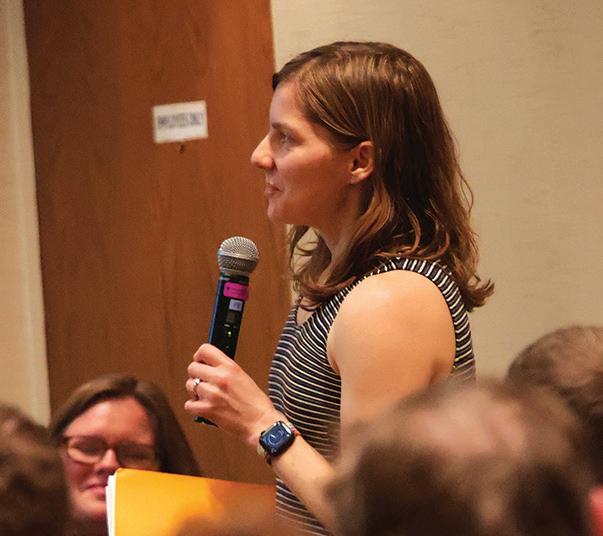
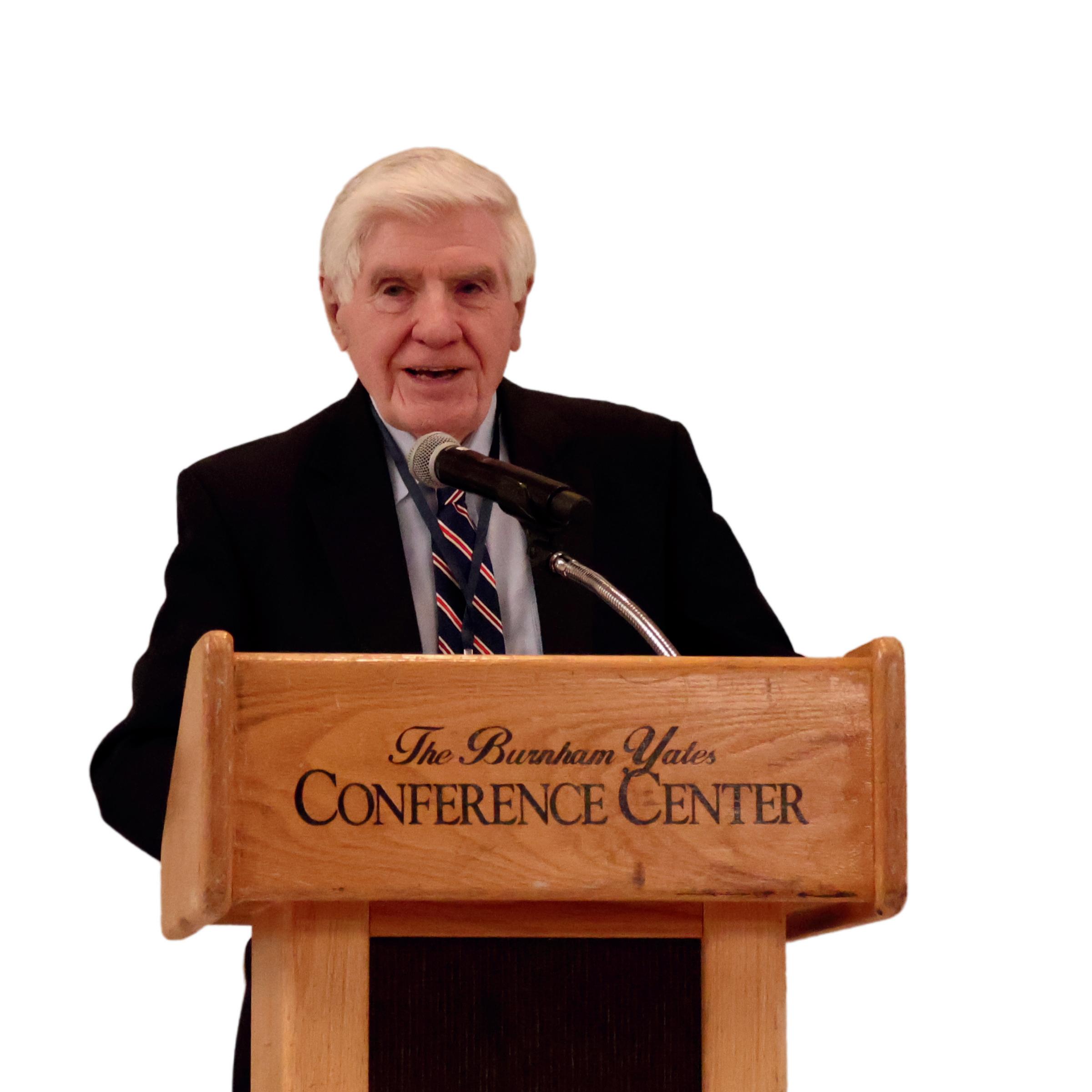
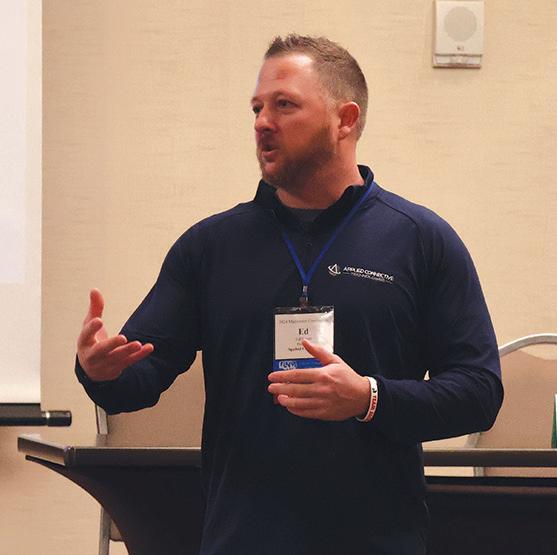
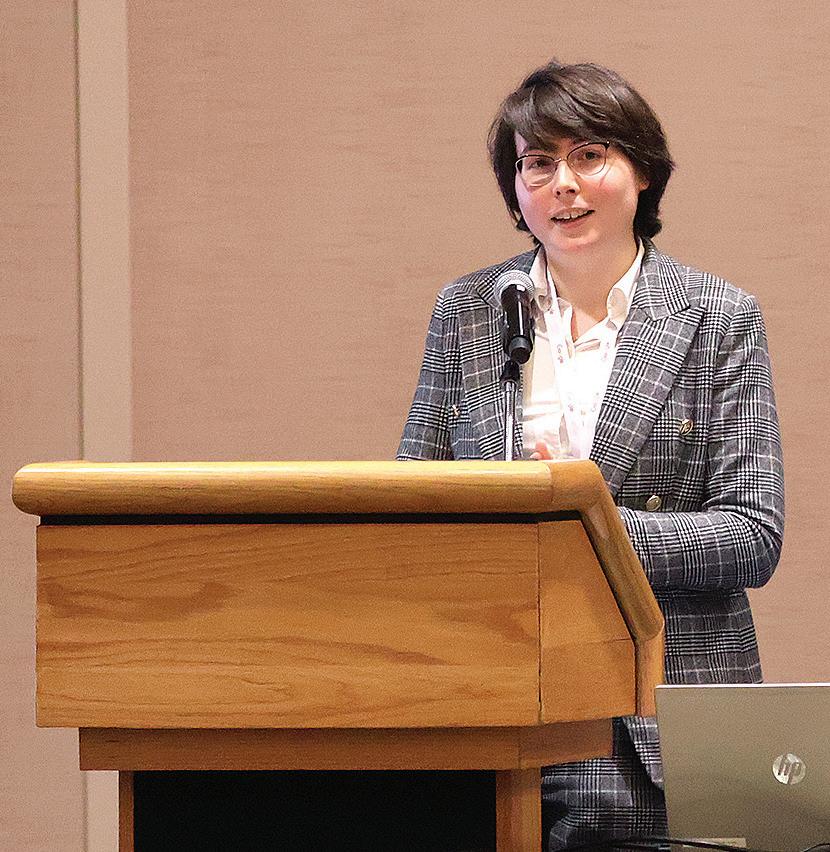
REVIEW
NEBRASKA MUNICIPAL
8
Jeff Hofaker - City Administrator, Sutton
Ed Knott - President, Applied Connective
Weslyn Church - Customer Engineer, Google
Former U.S. Senator and Gov. Ben Nelson
Jenny Mason - Director, Disaster Recovery - NDED
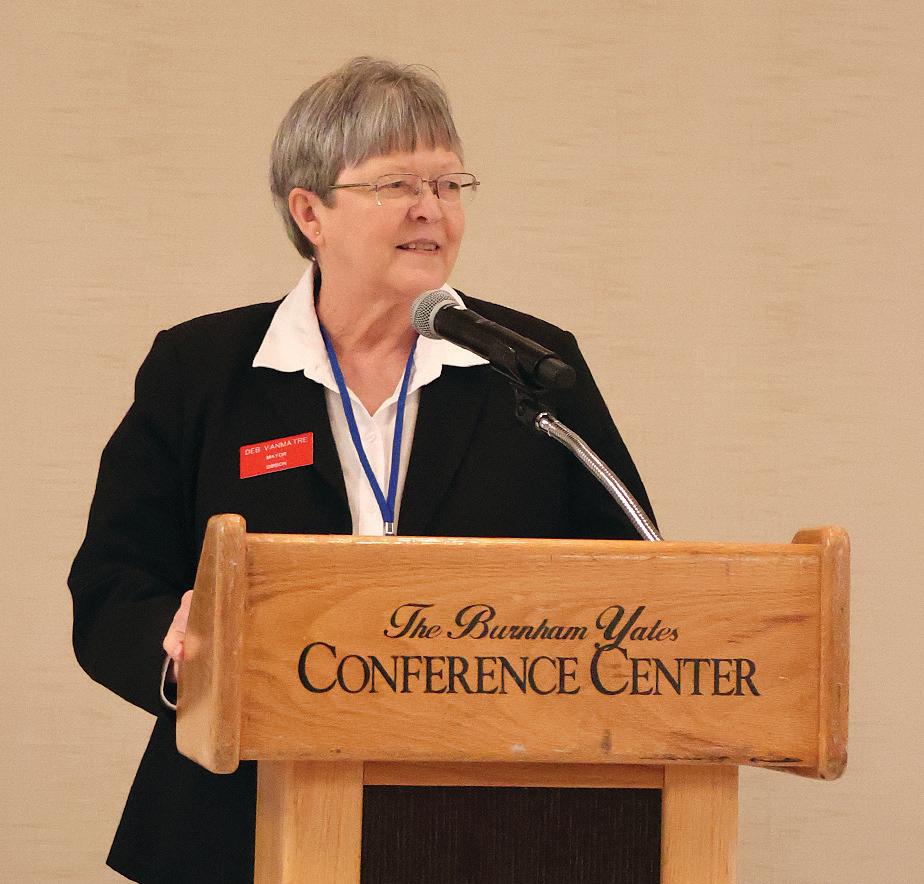
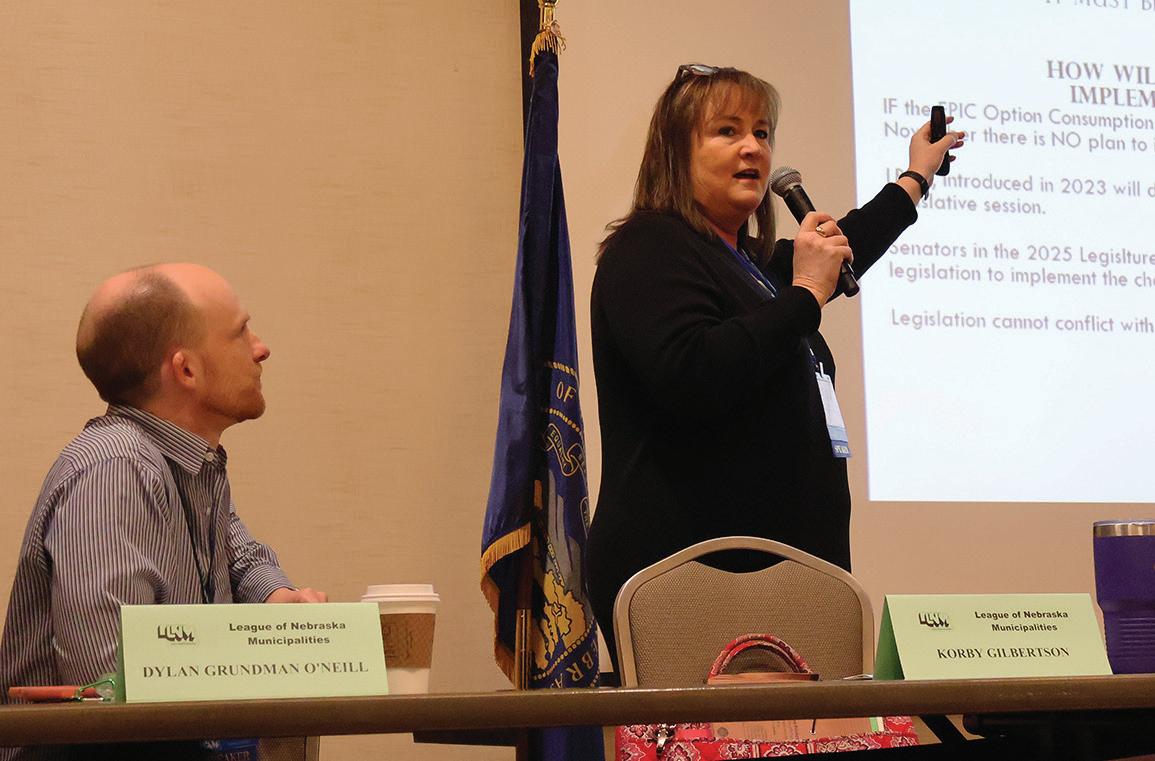
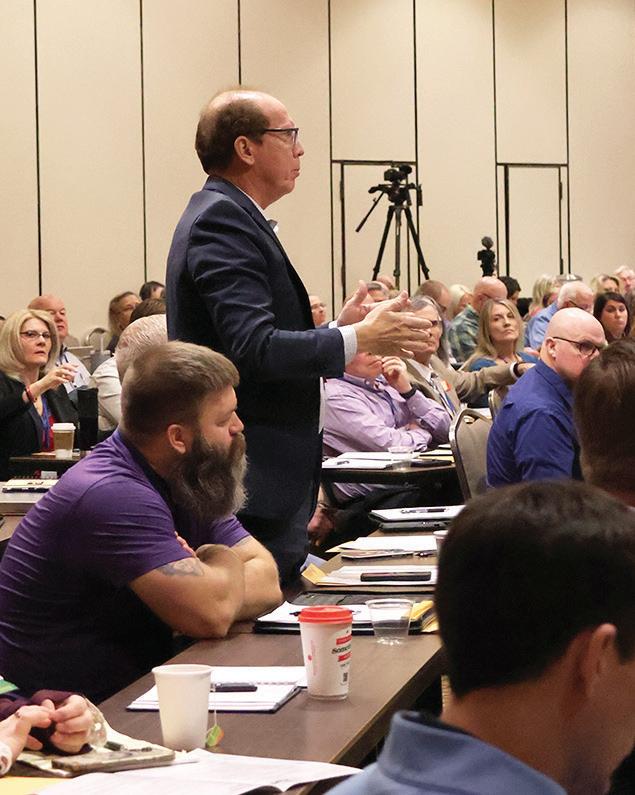
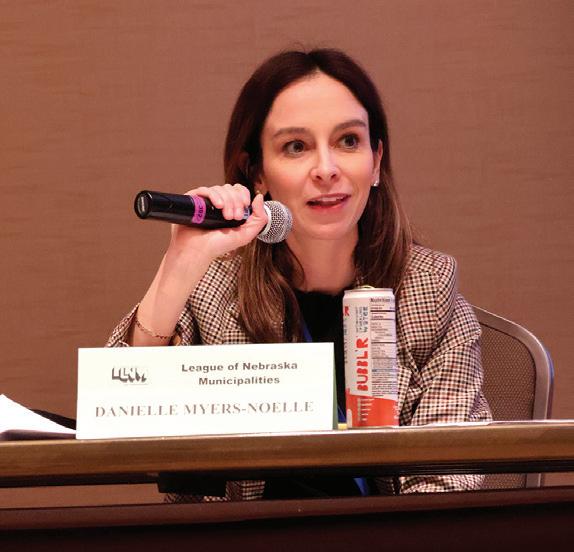
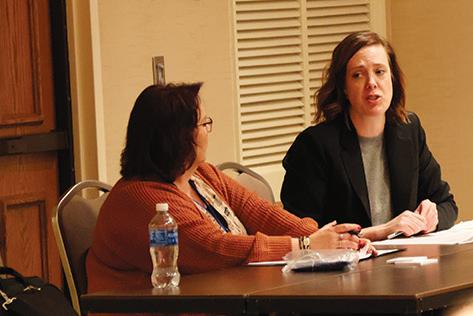


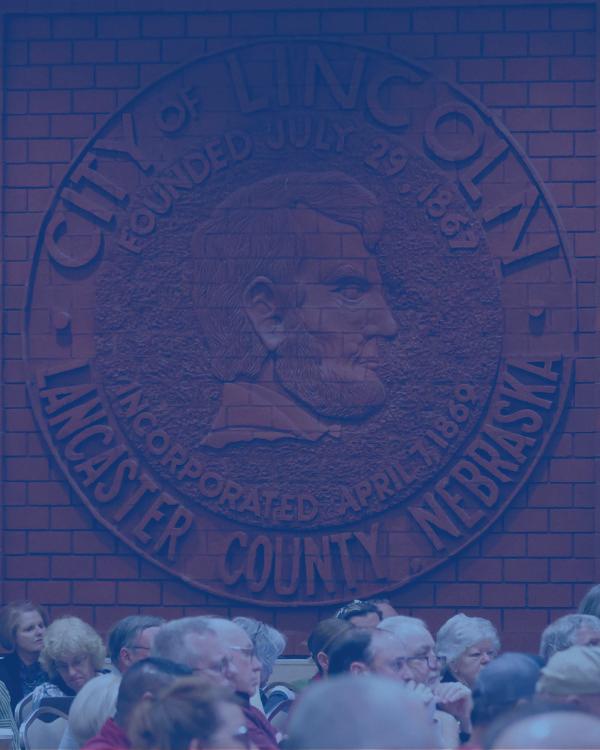
9 MARCH 2024
Above: The League Insurance Government Health Team (LIGHT) held its Board of Directors meeting on Feb. 27.
Above left: Korby Gilbertsen, contract lobbyist with Radcliffe Gilbertson & Brady, and Dylan Grundman O’Neill, from the Institute on Taxation and Policy, teamed up to present on EPIC and the consequences that could come with enacting such legislation. Above right: Sen. Barry DeKay visits with municipal constituents at the Annual Senator Appreciation Luncheon.
Thank you to all conference sponsors! See page 10 for a full list. 9
Above left: Many questions regarding EPIC and other issues facing municipal officials were addressed during the 2024 Midwinter Conference. Above right: Paul Lambert, League Past President and Mayor of Plattsmouth, visits with Erv Portis, Assistant Director of NEMA, and Emily Bausch, City Administrator of Plattsmouth.
Deb VanMatre - League President & Mayor of Gibbon
Dani Myers-Noelle - City Attorney, Norfolk
Midwinter Conference Sponsors


A huge thanks to the conference sponsors and supporters! You make all of this possible.
• American Legal Publishing
• AMGL, PC CPAs & Advisors
• Applied Connective Technologies
• BD Construction, Inc./Kearney
• Benefit Management
• Bike Walk Nebraska
• Black Hills Energy
• Blue Cross and Blue Shield of Nebraska
• Carrothers Construction Co., LLC
• Central Nebraska Economic Development District
• City Services
• Commercial Recreation Specialists
• Cunningham Recreation/GameTime
• Cybersecurity and Infrastructure Security Agency (CISA)
• Core & Main
• Creative Sites
• D.A. Davidson & Co.
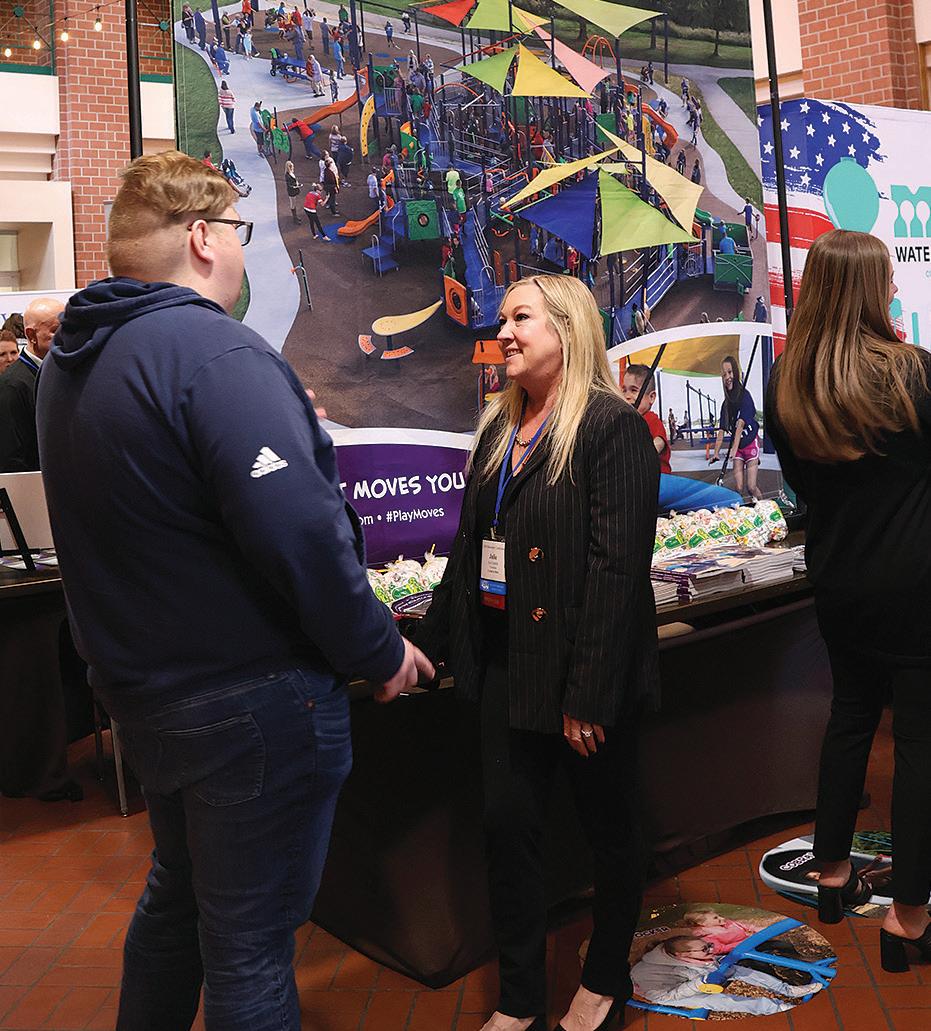
• Enbridge
• Felsburg Holt & Ullevig
• Filament Essential Services
• Galloway Financial Advisors
• Hydraulic Equipment Service, Inc.
• Inclusive Communities
• inHANCE Utilities
• JEO Consulting Group
• Johnson Service Company
• League Association of Risk Management (LARM)
• Maguire
• Miller & Associates Consulting Engineers, P.C.
• Nebraska CLASS
• Nebraska Energy Federal Credit Union
• Nebraska Public Power District
• Nebraska Regional Officials Council (NROC)
• NMPP Energy
• Northland
• NPAIT
• Olsson
• PeopleService
• Piper Sandler & Co.
• Prochaska & Associates
• Proseal Inc.
• Schemmer
• Snyder & Associates
• Social Assurance for Government
• Sparq Data Solutions
• Tyler Technologies
• Union Bank & Trust
• USDA Rural Development
• Vacanti Municipal Consulting Service, LLC
• Viking Industrial Painting


10 NEBRASKA MUNICIPAL REVIEW

The League Insurance Government Health Team (LIGHT) helps hundreds of
members throughout Nebraska obtain affordable health insurance coverage.
Plan and Network Choices
With seven plan options and three networks to choose from, you’re sure to find one that meets your group’s coverage and benefit needs.
Affordable Plan Options
Offering your employees much-needed protection against the high cost of medical care:
• Three PPO options
• Four HSA-eligible high deductible options
• Prescription drug coverage
Enrollment Options
Single: Covers the employee only
Employee and spouse: Covers the employee and their spouse
Employee and children: Covers the employee and their eligible dependent children, but does not provide coverage for the spouse
Family: Covers the employee and eligible dependents including a spouse
RECEIVE DEDUCTIBLE AND OUT-OF-POCKET CREDIT FROM YOUR CURRENT VALID GROUP PLAN WHEN YOU SWITCH!
Available Network Options
With several networks available,
have easy access to quality providers:
• NEtwork BLUE (Statewide)
• Premier Select BlueChoice (Regional)
• Blueprint Health (Regional)
• Out-of-state network availability
11 MARCH 2024
you
Blue Cross and Blue Shield of Nebraska is an Independent Licensee of the Blue Cross and Blue Shield Association. 60-025-58 (01-17-23) LET’S GET STARTED Contact your current local Agent/Broker Or contact Dennis Maggart Executive Vice President P: 913-378-9841 or 816-718-0335 Dennis@McInnesGroup.com Jane Limbach Account Man ager P: 913-378-9840 Jane@McInnesGroup.com GET A QUOTE AND JOIN TODAY!
its

Going green
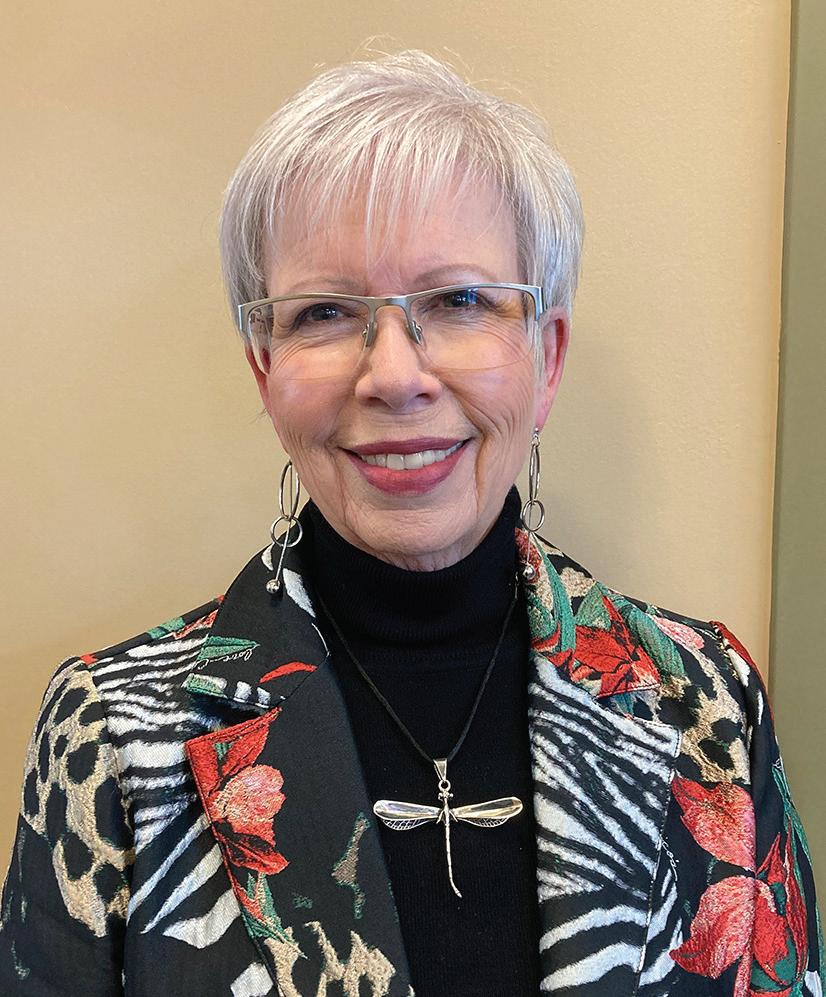 Director,
Director,
Wahoo powers a ‘win, win, win’ with new solar plant that has a
library twist
BY JULIE ANDERSON, OMAHA WORLD-HERALD
Denise Lawver was attending a community development meeting in Wahoo a couple of years ago when solar power developers were giving a presentation on the technology.
Wahoo Utilities had been eyeing a possible solar project, but the site had fallen through. Lawver told city officials to let her and her husband, Mike Lawver, know if they were interested in their property, situated near an electric substation on the east edge of town.
They were. And that led to the day in December when the city and its partners energized an array of 6,500 solar panels on 10 acres of a farm the couple owns. With a capacity of 2 megawatts, the solar array generates enough electricity to power about 350 homes a year.
Thanks to the Lawvers, the project also eventually will bring the city’s library, where Denise Lawver is director, more than just kilowatts. The couple last summer placed the farm in a trust benefiting the Wahoo Public Library Foundation, which eventually will receive not only the
12 NEBRASKA MUNICIPAL REVIEW
The new Wahoo Utilities solar power farm, photographed with a drone, is just east of Wahoo. Photo by Anna Reed, Omaha World-Herald
Denise Lawver
Wahoo Public Library
Photo provided by the Omaha World-Herald

land but also the lease payments from the project.
“It’s really neat that, in a way, this is eventually going to be funding our library foundation,” said Ryan Hurst, Wahoo Utilities’ general manager.
The Wahoo project came online as interest in solar power is growing in Nebraska. Wahoo, with a population of about 5,000, is among approximately 40 communities served by the Nebraska Public Power District that have added solar generation, which is allowed under NPPD’s contracts with those communities. Total installed solar is 58 megawatts.
More than 30 additional solar projects are either committed or under development, according to the Nebraska Department of Environment and Energy. That includes the Omaha Public Power District’s 81-megawatt Platteview Solar plant near Yutan, about 15 miles from Wahoo, which is slated to go online this spring.
Continued on page 19 / See Wahoo



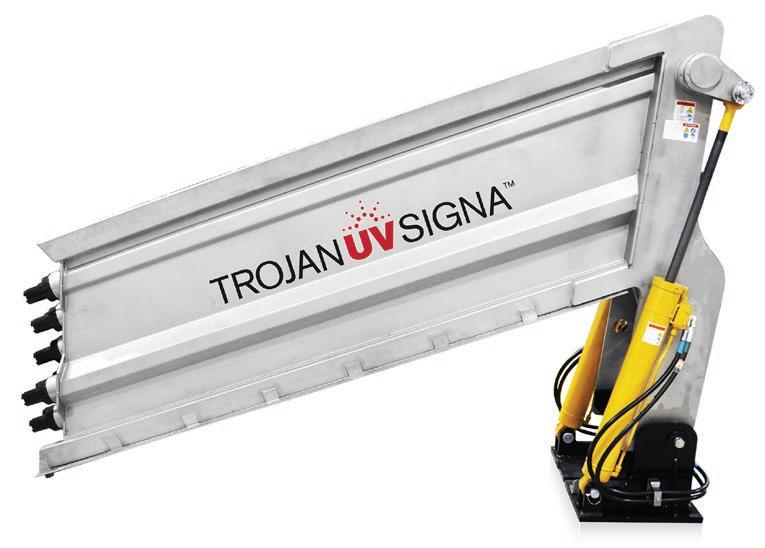
13 MARCH 2024
Engineering a world where everyone thrives. Engineering | Architecture | Surveying | Planning jeo.com 800-383-PUMP www.electricpump.com 402-333-9660 www.mc2h2o.com You can count on us for all your fluid handling and process solutions! An Electric Pump Company
Ryan Hurst General Manager, Wahoo Utilities
Photo provided by the Omaha World-Herald
National League of Cities Local leaders attend Congressional City Conference in Washington D.C.

Over 49 million homeowners will put themselves at risk this year by not contacting 811 before digging.*
Whether you’re an excavator or a facility operator, keep yourself and those around you safe by helping to increase awareness about the importance of contacing 811 before digging.
*According to a February 2023 survey of American homeowners.






















14 NEBRASKA MUNICIPAL REVIEW Find us online
Above: Ralston City Council President, Brian Kavanaugh; Representative Don Bacon; Gibbon Mayor and League President, Deb VanMatre; Ralston Mayor, Don Groesser at NLC Congressional City Conference in Washington D.C. Right: League President Deb VanMatre poses for a quick photo at CCC. NLC is currently celebrating 100 years of helping support local officials.
MWC
Continued from page 8
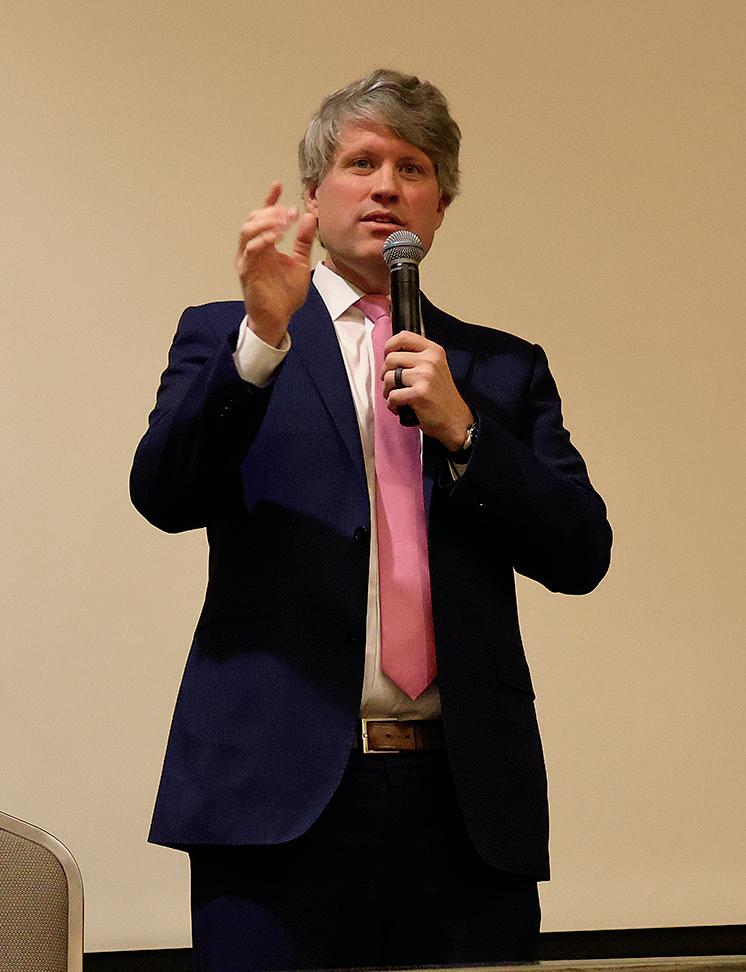
eliminate our current tax structure, you are eliminating the current exemptions that exist. So if you have from sales tax, income tax or property tax—political subdivisions, churches, schools—all of you will have to pay the tax too. There are no exemptions [in the Constitution].”
On Tuesday, the topic of EPIC continued with a panel presentation on how to educate municipal officials and others on the legislation by Jeff Hofaker, City Administrator from Sutton, Melissa Harrell, City Administrator from Wahoo, and Layne Groseth, City Administrator from North Platte.
Speakers also covered several other topics of interest to municipalities, including artificial intelligence, social media policies and court cases going before the U.S. Supreme Court, community partnerships with the Nebraska Military Department, strategic planning for municipalities and more!
Additionally, conference attendees were granted a firsthand glimpse inside the office of the Nebraska Attorney General with a presentation by Attorney General Mike Hilgers. Attorney General Hilgers touched on the priorities of his office in protecting the safety of Nebraskans, particularly those with an impact on municipal operations and public safety.
Attendees also enjoyed a keynote address by Former U.S. Senator and Nebraska Governor Ben Nelson. Senator Nelson talked about the art of compromise and the impact it can have in minimizing the politics of division. After many years in politics and serving in the private sector, Sen. Nelson had many stories and examples to share to bring context to his message. He also brought copies of his book and stayed to sign copies for attendees.
To close out the Midwinter Conference, the League hosted the Annual Senator Appreciation Luncheon. Speaker John Arch welcomed the attendees and gave his thoughts on the progression of the second session of the 108th Legislature.
Thank you to the following Senators who made time to attend and visit with their constituents representing municipalities:
Sen. John Arch
Sen. Beau Ballard
Sen. Bruce Bostelman
Sen. Tom Brandt
Sen. Tom Brewer
Sen. Barry DeKay
Sen. Robert Dover
Sen. Ben Hansen
Sen. Teresa Ibach
Sen. Mike Jacobson
Sen. Loren Lippencott
Sen. Terrell McKinney
Sen. Mike Moser
Sen. Dave Murman
Sen. Merv Riepe
Sen. Rita Sanders
Sen. Lynne Walz
Thank you to all attendees and sponsors for helping make the event a success. There were many well-seasoned veterans of municipal government and even some new faces in attendance. Hopefully, everyone was able to find sessions that pertained to them and learn something new.

15 MARCH 2024
Attorney General Mike Hilgers
USDA Rural Development:
Celebrating quality water in central Nebraska
Many communities in the State of Nebraska are facing the concerns of aging infrastructure and the effects that has on their residents’ access to safe drinking water or sanitary wastewater systems, as well as the proper quantity needed for the demands of their community. Along with these concerns comes the big question of “how do we fund the improvements of these systems?”. USDA Rural Development has several different programs to help a community with many different projects a community may have on their list, including a program that can solve those water and wastewater concerns.
Quality water and a new tower in Beaver City
Rural Development funds were used to help the City of Beaver City access better quality water, as well as a higher quantity that was needed to better serve the needs of their community. The project was completed with assistance from the Community Development Block Grant program as well.
The City had two of their five wells contaminated from Campylobacter, a third well had high arsenic levels, so they were not able to use it, and the remaining two wells were experiencing lower production, with only generating 350 gpm for a City with that had a peak flow need of 348 gpm. The city also had a ground level storage tank that was at the end of its useful life.
Beaver City had two new wells developed, replaced distribution pipes, put in new water meters, and built a water tower, which was the first for their community! These improvements made sure that the City complied with both quality and quantity regulations and standards
Water & Waste Disposal Loan & Grant Program
(A more in-depth overview can be found on page 17.)
What does this program do:
Provides funding for clean and reliable drinking water systems, sanitary sewage disposal, sanitary solid waste disposal, and storm water drainage in rural areas.
Who is eligible:
Most state and local governmental entities, private nonprofits, and Federally recognized Tribes in rural areas and towns with populations of 10,000 or less, or Tribal lands in rural areas.

for their 609 residents. The city was celebrating 150 years when the project was coming to completion in 2022, and designed their new water tower to mark this milestone accordingly.
What kind of funding is available:
Long-term (up to 40 years), lowinterest loans. If funds are available, grants may be combined with a loan if necessary to keep user costs reasonable. Loan term based on useful life of facilities financed and has a fixed interest rate for the life of the loan. Interest rate based on need for the project and the median household income of the area to be served.
To learn more about any and all of the USDA Rural Development Programs that might be of value to your community, visit its website at rd.usda.gov/ne or call its main line at (402) 437-5551.
How may funds be used:
To finance the acquisition, construction, or improvement of drinking water sources, treatment, storage, and distribution, sewer collection, transmission, treatment, and disposal, solid waste and storm water systems.

16 NEBRASKA MUNICIPAL REVIEW
Pipes from the new wellhouse in Beaver City. Photo provided by USDA RD.


Water & Waste Disposal Loan & Grant Program
What does this program do?
This program provides funding for clean and reliable drinking water systems, sanitary sewage disposal, sanitary solid waste disposal, and storm water drainage to households and businesses in eligible rural areas.
Who may apply?
This program assists qualified applicants who are not otherwise able to obtain commercial credit on reasonable terms. Eligible applicants include:
• Most state and local governmental entities
• Private nonprofits
• Federally recognized Tribes
What is an eligible area?
Areas that may be served include:
• Rural areas and towns with populations of 10,000 or less – check eligible addresses
• Tribal lands in rural areas
• Colonias
What kinds of funding are available?
Long-term, low-interest loans. If funds are available, a grant may be combined with a loan if necessary to keep user costs reasonable
How may the funds be used?
Funds may be used to finance the acquisition, construction, or improvement of:
• Drinking water sourcing, treatment, storage, and distribution
• Sewer collection, transmission, treatment, and disposal
• Solid waste collection, disposal, and closure
• Storm water collection, transmission, and disposal
In some cases, funding may also be available for related activities such as:
• Legal and engineering fees
• Land acquisition, water and land rights, permits, and equipment
• Start-up operations and maintenance
• Interest incurred during construction
• Purchase of facilities to improve service or prevent loss of service
• Other costs determined to be necessary for completion of the project
• See 7 CFR Part 1780.7 and 1780.9 for a complete list
What is the loan term and rate?
The loan term is up to a 40-year payback period, based on the useful life of the facilities financed with a fixed interest rate. The interest rate is based on the need for the project and the median household income of the area to be served. Contact us for details and current interest rates applicable for your project.
Are there additional requirements?
• Borrowers must have the legal authority to construct, operate, and maintain the proposed services or facilities.
• All facilities receiving federal financing must be used for a public purpose.
• Partnerships with other federal, state, local, private, and nonprofit entities that offer financial assistance are encouraged.
• Projects must be financially sustainable.
17 MARCH 2024
Prospers
Together, America
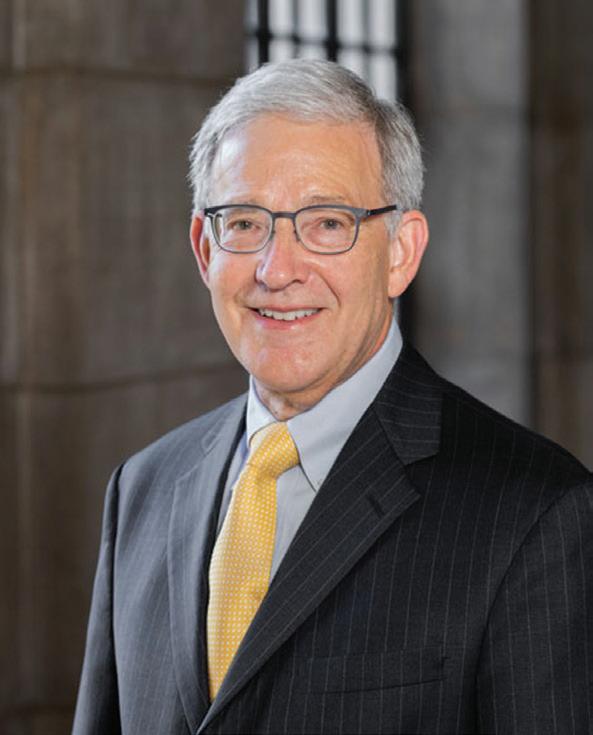 BY SEC. OF STATE BOB EVNEN
BY SEC. OF STATE BOB EVNEN
NBe prepared! Make sure you have your photo ID ready to vote in the May election
ebraskans will need to keep their photo ID handy when they vote in the May 14, 2024, statewide primary election.
The new voter ID law, which passed with bipartisan support in the Nebraska Legislature, takes effect in the May primary and will be in effect for every Nebraska election after that.
The law follows what voters overwhelmingly approved in the last general election – a constitutional amendment for photo ID in Nebraska elections.
More than 97% of Nebraska voters already have a state-issued ID, such as a driver’s license or a state ID, that will work for voting purposes. For many of us, there will be little change when it comes to voting. We’ll bring our driver’s license with us to our polling place. By-mail voters will write their license number on our early voting application or ballot return envelope.
“More than 97% of Nebraska voters already have a stateissued ID, such as a driver’s license or a state ID, that will work for voting purposes. For many of us, there will be little change when it comes to voting.”
using one of those IDs to vote by mail, you will simply insert a photocopy of the ID into your return envelope. There are resources for voters who do not have an acceptable form of ID for voting. Nebraskans can get a free state ID for voting at their local DMV. Nebraskans can get a free certified copy of their Nebraska birth certificate to obtain a state ID. They will need to contact the Nebraska Department of Health and Human Services for more information. More information is available at voterID. nebraska.gov.
- Sec. of State Bob Evnen
The new law is another security tool to ensure our elections are accurate and secure. Our elections division and county election officials are dedicated to maintaining accurate voter rolls, ballot-counting machines and reporting mechanisms.
Other IDs are accepted as well. Those include a military ID, tribal ID, U.S. passport, hospital or nursing home record, Nebraska college ID or an ID from a political subdivision (state, county, city, public school, etc.) If you’re
I encourage every voter to get to know their county election official and ask about the various measures that are in place to protect our elections. Your Nebraska election workers – your neighbors, family members, friends – care deeply about our elections.
I hope to see you, with ID in hand, at the polls on May 14, 2024.

18 NEBRASKA MUNICIPAL REVIEW
COMMENTARY
THE

Continued from page 13
Hurst said the Wahoo solar project provides a hedge against future cost increases and provides the city with an economic development tool. While Wahoo doesn’t have carbon reduction goals of its own, city officials recognize that businesses and industries considering locating there might. The city also added two fast-charging electric vehicle stations in partnership with NPPD.
Local officials, who held a ribbon-cutting ceremony at the facility earlier this week, also like the fact that the solar is generated in their own backyard. The city also operates its own 10-megawatt dual fuel diesel and natural gas generating plant.
Affordability was the key consideration, Hurst said. Under its contract with solar developer and facility owner Sol Systems, the city locked in a rate for the next 30 years that is only slightly higher than the current rate for the electricity it purchases
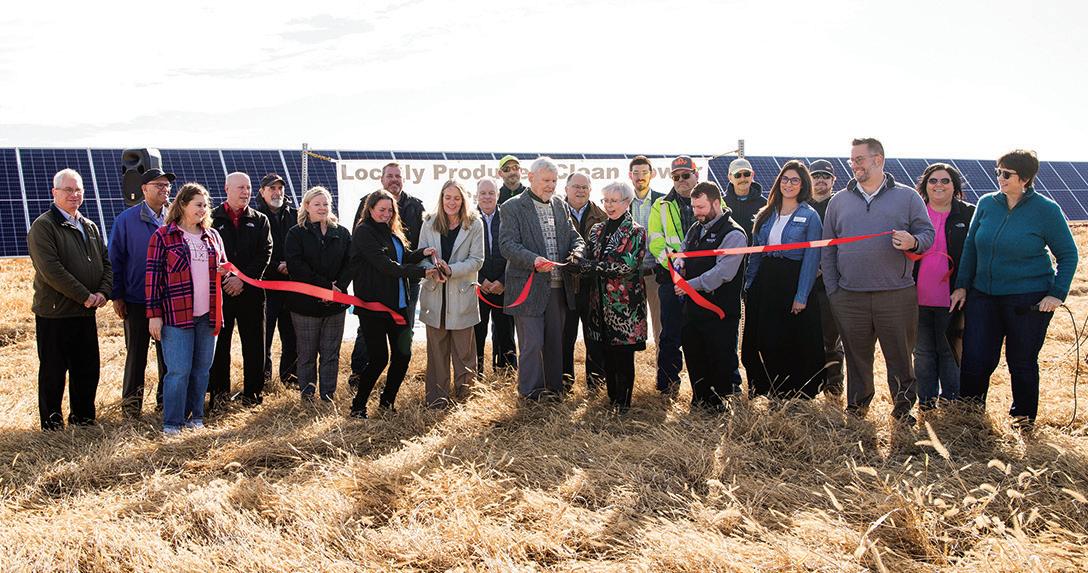
wholesale from NPPD, which supplies 88% of its electricity. If the solar plant performs as modeled, it could supply up to 6% of the city’s electricity.
“It had to make financial sense for us,” he said. “And it did.”
Hurst noted that the city signed its contract at the right time in May 2022 — after the height of the pandemic and before
the passage of the Inflation Reduction Act, which is incentivizing solar and other renewable energy development and increasing demand. The law also will allow public utilities to tap tax credits they could not previously access.
19 MARCH 2024
The Wahoo Chamber ribbon cutting for the new $2.7 million solar plant. The 10-acre site helps provide a hedge against future cost increases and provides the city with an economic development tool. Photo by Kate Decoste, shared by Wahoo Chamber & Economic Development
The Wahoo Utilities solar farm has 6,500 panels on 10 acres of land. Photo by Anna Reed, the Omaha World-Herald
Reprinted with permission from the Omaha World-Herald
Poppies
Continued from page 6
Yanney Heritage Park is a donordriven park. In this situation, this means each park component is endowed of its cost to be put into a growth account to be used for future repair or maintenance. In Kearney, the community has really stepped up to offer its support, there has been tremendous success with the private donations and a variety of public matching grants to add different park components. The Yanney Heritage Park Foundation is responsible for the development of the park and upon completion of the park, the foundation will deed it to the City of Kearney for only the cost of ongoing maintenance.
Yanney Heritage Park has come a long way over the years. What started out as an 80-acre cornfield has been transformed into a first-class city park with many unique features. The park has been and continues to be blessed with many generous donations and is well on its way to becoming one of the finest city parks in the Midwest.


The foundation’s mission is to design and develop “the finest family park between Omaha and Denver.” The park is free to the public (except for building and equipment rentals for a small fee) which allows it to be accessible to everyone.
To learn more about the park, visit yanneypark.org.

20 NEBRASKA MUNICIPAL REVIEW
A new installation of brightly-colored poppies in Kearney are part of a public-private partnership. The flowers are one of the multiple features in Yanney Heritage Foundation Park. Photos provided courtesy of the Yanney Heritage Park Foundation.



21 MARCH 2024
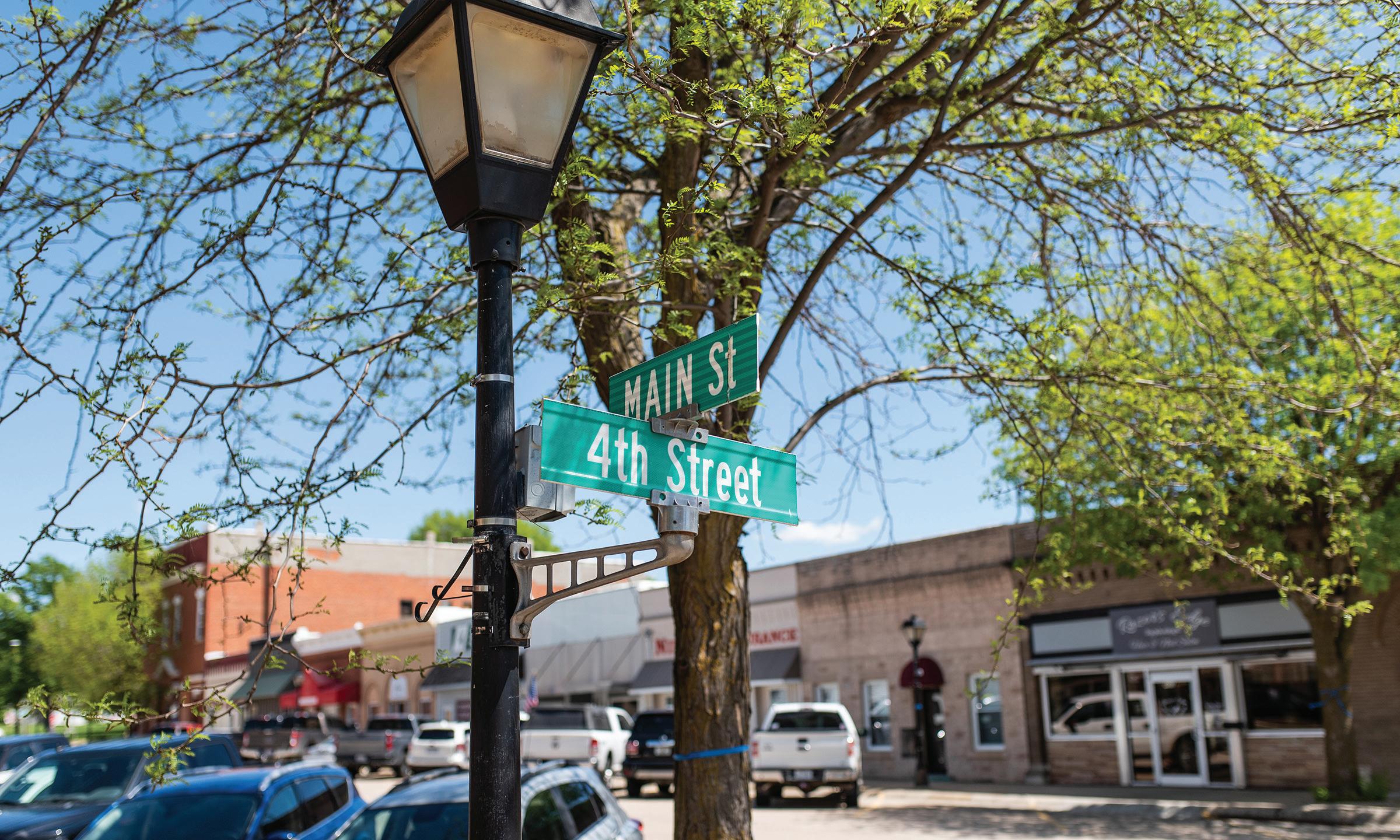
Center for Rural Affairs:
Resources available to address communities’ environmental and energy challenges
BY DEBORAH SOLIE, CENTER FOR RURAL AFFAIRS
The Heartland Environmental Justice Center (HEJC) is a first-stop resource for communities seeking help with pressing environmental and energy equity challenges.
We offer no-cost, customized support to strengthen communities’ ability to identify challenges, plan and implement solutions, and work toward achieving their goals. What does that mean? Below are examples of support and training available through the HEJC.
Custom support
Every community and organization addressing environmental and energy equity challenges has unique and evolving needs. HEJC program managers, community program coordinators, and partners can support these needs by providing resources and connections.
Examples of our support services:
• Assistance finding the right grant for your community project,
• Host a virtual or in-person needs assessment for your community,
• Build a project budget with you,
• Connect you with environmental organizations across the region to support coalition-building and partnership development,
• Support on engagement with government processes and navigating federal systems such as grants.gov and SAM.gov,
• Help you establish a nonprofit organization,
• And more!
Continued on page 27 / See Energy
22 NEBRASKA MUNICIPAL REVIEW
Photo of downtown Neligh provided by the Center for Rural Affairs.


Our bankers specialize in:
• Bond Anticipation Notes
• Paving Bonds
• Water and Sewer Bonds
• General Obligation Bonds
• Utility System Revenue Bonds
• Lease-Purchase Financing
Call:
(800) 528-5145 I Paul Grieger
(866) 809-5596 I Cody Wickham
(866) 809-5443 I Andy Forney
(866) 466-9368 I Jerry Spethman
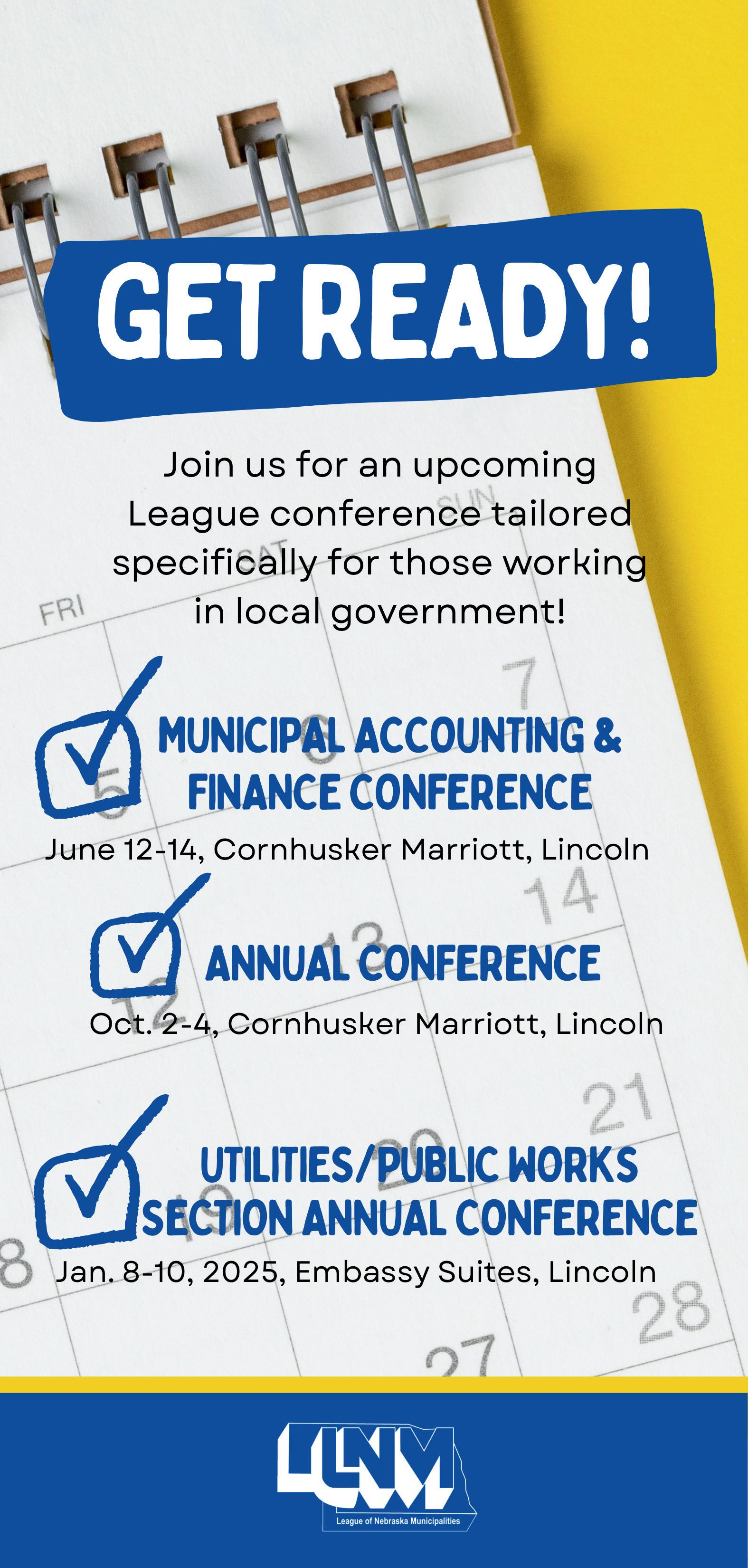
MARCH 2024
nation.
D.A.
Davidson & Co. is committed to strengthening the infrastructure and enriching the lives of people in our communities throughout Nebraska and across the
Regency Parkway, Suite 400 Omaha, NE 68114
(800) 206-7523
Davidson & Co. member FINRA and SIPC dadavidson.com
450
|
D.A.
Building a better future in NEBRASKA with a strong Public Finance Partner
breaking it down:
Cost injured worker of an
... and how to create a culture of safety in your municipality the
Joe trips on a bucket a co-worker left in a hallway and suffers a back injury. He can be at work again in a month but only to do very light-duty tasks. There may be surgeries, physical therapy appointments, and recovery time before Joe can perform his previous duties. Workers’ compensation insurance helps pay for some of the costs of an employee’s on-the-job work injury, but an employer should consider the other actual costs of injuries in the workplace.
The Occupational Health and Safety Administration (OSHA) provides an online calculator to estimate what a work injury costs a municipality or private business. For instance, entering into the calculator a sprain suffered by an employee may cost $30,000 in a Workers’ Comp claim,
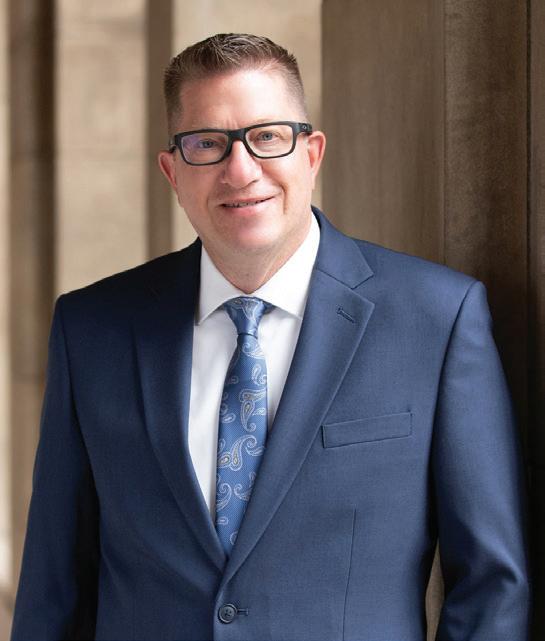 DAVE BOS EXECUTIVE DIRECTOR, LARM
DAVE BOS EXECUTIVE DIRECTOR, LARM
but the OSHA worksheet calculates an additional $33,000 in costs to the employer in missed work time and disruption in the workplace.
The injured employee’s co-workers will need to fill in for the duties that the injured employee can no longer do or can only do at a reduced capacity which takes away from their work. Projects may have to be postponed or canceled with the reduced workforce unable to do the job.
Injuries in any workplace are a hardship for the employee and the municipality. That’s why it is vital that everyone, from elected officials to the people in the field, be committed to safety. It needs to be part of the culture of every city or village.

Ideas!
tohelpmakeyourcommunityhaveacultureofsafety:
1.Hirequalifiedpeople.Amunicipalityisaskingforextracostsandthepossibilityofaliability claimiftheydootherwise.
2.Testfordruguse.Haveapolicyonzerotoleranceforillegaldruguseintheworkplacetoensurenooneisworkingundertheinfluenceofdangerousdrugs.
3. Develop a training manual. This gives employees an easy reference point about the safe and properuseofapieceofequipment.
4.Requireregularsafetytrainingforallstaff.
5.Providethecorrectequipment,time,andspaceforemployeestodotheirjobssafely.
6. Avoid overtime when possible. It’s estimated that a worker is 60% more likely to be injured whenworkingextrahours.
7.Useincentivestoencourageemployeestobesafe.Thiscouldbesomethingsimplelikehavingadrawingforagiftcardaftersomanydayswithoutaninjuryoraccident.
8. Document and discuss near misses. This can be done at regularly held safety committee meetings.
And Remember!
Asafetycultureinamunicipalitytakestimeandcommitmenttodevelopbut livesandthesuccessofacitygovernmentoperationmaydependonit.
2424 NEBRASKA MUNICIPAL REVIEW
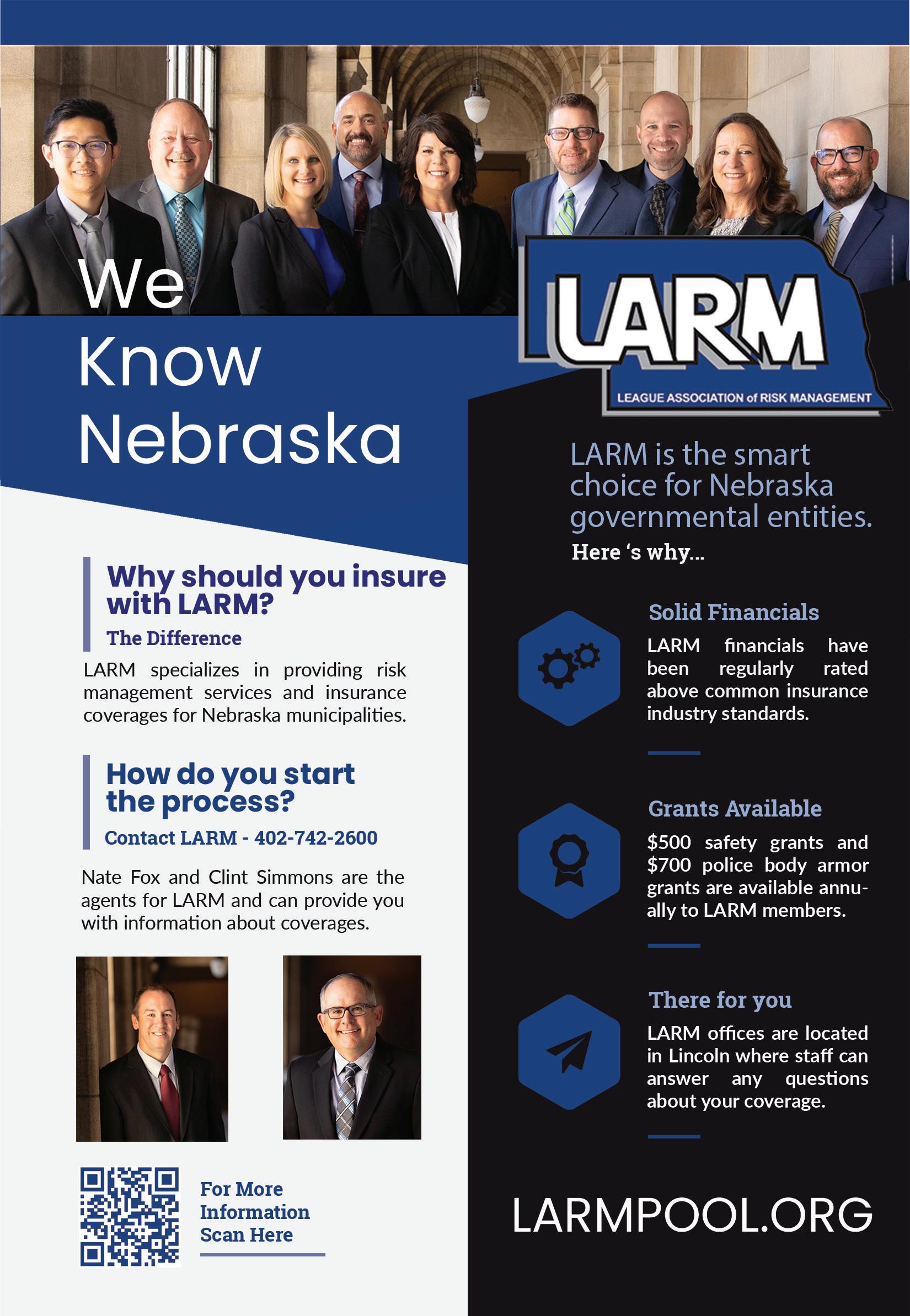
25 MARCH 2024
Read the comments, but with care and a plan
BY BEN HAYLE COMMUNICATIONS MANAGER, CITY OF BLAINE, MN

“Do these city leaders have any clue what they are doing?”
“This mayor is an idiot!”
“I can’t stand the police department!”
“Why are they letting those people in my neighborhood!”
Every government social media page has experienced these types of comments and often much worse, leaving those who manage social media to determine when to engage and when to ignore.
These types of remarks also generate questions from elected officials and city staff asking why the comments can’t just be deleted. The answer to that question is quite simple: The First Amendment protects this type of speech on our government social media pages.
First Amendment protections
No matter how well your city’s social media policy is written, it will never supersede the First Amendment. In most cases, removing comments limits the user’s First Amendment right to have their opinion viewed. Even hate speech has been deemed protected speech in a unanimous opinion from the U.S. Supreme Court.
A way to engage
It is important to remember that social media pages are not your website or newsletter. Social media is designed to be a place for conversation. Engaging with your community on social media is key to building trust and growing your audience. Everyone who manages social media will at some point wish they could just ignore the comments and move on to the next task, but by engaging on social media you will build a platform that is relevant and trusted.
Tips for success on social media
Ensuring your social media pages are informative, engaging, respectful, and legally compliant can be tricky. However, here are some tactics that will help you achieve success: Develop a social media policy. It’s critical to have a well thought-out policy that details how your organization will
conduct business on social media. This policy should be reviewed by your city attorney. It’s also a good idea to have your attorney consult with another attorney who specializes in this area.
Participate in ongoing training. Anyone who has access to your social media pages should receive government social media training each year. There are several good resources for training. The Government Social Media association provides professional development opportunities and hosts an annual conference solely focused on government social media topics and trends.
Be innovative. Do not be afraid to try something new and different on social media. You should be able to have some fun on the various platforms, even if you work in government. Have your police officers help you recreate the latest TikTok trend or go on a ride along in a snowplow during the next snow storm and share updates.
Social media has changed the way that we communicate and it continues to evolve all the time. This powerful tool can be a great resource, a chance for real two-way engagement, and a place to make your community shine. Being responsible for a city’s social media is not an easy role, but with the right training and support, you can use it for the betterment of your city.
26 NEBRASKA MUNICIPAL REVIEW
SOCIAL MEDIA FOR MUNICIPAL GOVERNMENT
When
is it OK to remove a social media comment?
See page 27 to learn more.
When is it OK to remove a social media comment?

Relevant First Amendment case law permits government social media pages from hiding or deleting certain comments. Always consult with your city attorney before taking any action to remove comments on social media.
Comments that may be removed, include:
• Comments directly advocating violence or illegal activity.
• Comments containing obscenity, which is defined as sexually explicit and/or pornographic content that is patently offensive, appeals to prurient interest, and lacks serious literary, artistic, political, or scientific value.
• Comments that directly promote or advocate that the city illegally discriminates based on race, age, religion, gender, national origin, disability, sexual orientation, veteran status, or any other legally protected class.
• Comments containing links to malware and/or malicious content that affects the normal functioning of a computer system, server, or browser.
• Duplicate comments posted repeatedly within a short period of time.
• Comments containing actual defamation against a person, either as determined by a court or comments that are patently defamatory by easily discovered facts.
• Comments that contain images or other content that violate the intellectual property or copyright rights of someone else, if the owner of that property notifies the city that the property was posted in a comment on the city’s social media account(s).
• Comments that contain a hyperlink to any website other than those controlled by your city. This must be done without regard to the viewpoint of the comment containing such a link or the content of the site to which the link redirects.
• This information is based on best practices, but before deleting a comment you should consult with your city attorney. Records of deleted comments should be retained according to the city’s record retention schedule to document the action taken and reasons justifying the decision.
This is a reference only and does not constitute legal advice. Reprinted with permission from Minnesota Cities, a publication of the League of Minnesota Cities, copyright 2023.
Energy
Continued from page 22
Training
We develop customized training for communities based on their unique needs or provide tools, templates, and resources to help communities maximize existing training opportunities. We connect communities to our training materials and help them apply their knowledge to real-time issues and projects.
Examples of our training services:
• Host a virtual or in-person training for your team on various topics including navigating and applying for grants, environmental justice concepts, environmental project design basics, community needs assessments, and more.
• Curate a custom resource hub for your organization with information on how to leverage these resources for progress on environmental and energy projects with which you need help.
• One-on-one talks with our community program coordinators to help you identify what training could be developed or provided based on your specific community needs.
We also can help identify the challenges your community faces. Even if your environmental and energy initiatives are outside the scope of what the HEJC can support, we can provide you with external resources and connect you with organizations that may be able to help.
In Nebraska, your contacts are part of the Center for Rural Affairs. Email them at ruralleaders@ cfra.org or call 402.687.2100. Visit the CFRA website at cfra.org/rural-resources to learn more about the HEJC and CFRA’s role. Information for this article was provided by the HEJC and may be accessed at heartlandej.org.
27 MARCH 2024

Adjusting performance expectations for employees on FMLA leave
BY TARA A. STINGLEY, CLINE WILLIAMS WRIGHT JOHNSON & OLDFATHER, L.L.P.
The Family and Medical Leave Act (FMLA) provides eligible employees the right to take up to 12 workweeks of unpaid, job-protected leave for specified family and medical reasons. The FMLA also prohibits employers from interfering with an employee’s use of FMLA leave.i
Much has been written about the prohibition of “interference” with FMLA rights, including how to account for employees’ absence from work when evaluating job performance. A recent federal court of appeals decision clarified employers’ obligations to evaluate and adjust performance expectations to avoid penalizing employees for taking FMLA leave.
FMLA Eligibility and Coverage
Under the FMLA, eligible employees with serious health conditions are entitled to medical leave, and it is unlawful for an employer to interfere with, restrain, or deny the exercise of or the attempt to exercise rights provided under the FMLA, or for an employer to discriminate against any individual for opposing any practice made unlawful by the FMLA.ii
The FMLA defines coverage with regard to covered employers as well as eligible employees. Covered employers include private-sector employers who employ 50 or more employees in 20 or more workweeks in either the current calendar year or previous calendar year, as well as public agencies, including federal, state, and local government employers, regardless of the number of employees.
If an employee works for a covered employer, the employee is eligible for FMLA leave only if they work for a covered employer for at least 12 months, have at least 1,250 hours of service with the employer during the 12 months before
their FMLA leave starts, and work at a location where the employer has at least 50 employees within 75 miles. Eligible employees have the right to take FMLA leave all at once, or, when medically necessary, in separate blocks of time or by reducing the time they work each day or week.
Wayland v. OSF Healthcare System
In Wayland v. OSF Healthcare System, the Seventh Circuit Court of Appeals considered an employee’s claim that her former employer violated her FMLA rights.iii The employee argued the FMLA required her former employer to adjust its performance expectations to reflect the employee’s reduced hours while she was on FMLA leave.
As an initial matter, the parties in Wayland disputed how much FMLA leave the employee actually took during her employment. The court found this dispute relevant, noting “a jury reasonably could find that when an employee is available for work only 80% of a full-time schedule, and the reason for the 20% shortfall is because she has taken protected leave, the employer must adjust its expectations to comply with the [FMLA].”iv
The Wayland court noted that, under the FMLA, “employers are prohibited from both ‘interfering with’ and ‘retaliating against’ an employee’s use of leave under the Act,” and the employer’s conduct “amounted to interference . . . if it denied her ‘benefits to which she was entitled.’”v Similarly, retaliation would occur if the employer fired the employee because she took FMLA leave.
In analyzing the employee’s claims, the Wayland court recognized, “For either claim, the Act does not require an employer to adjust its performance standards for the time an employee is actually on the job. But the Act can require that performance standards be adjusted to avoid penalizing
28 NEBRASKA MUNICIPAL REVIEW
CORNER
Tara A. Stingley
THE LEGAL
an employee for being absent during approved leave.”vi
Applying these standards, the court concluded a jury could find the employer interfered with or retaliated against the employee’s use of FMLA leave by holding her to performance standards “that were at least as demanding as when she worked full time, and then fired her for falling short.”vii Specifically, the court noted there was evidence that the employer did not adjust its standards to reflect the time the employee was away on approved medical leave.
According to the employee, “she was on approved medical leave for roughly 20% of full-time work, yet [her employer] told her that she had ‘no choice’ but to finish her projects under unrelaxed deadlines.”viii
The Seventh Circuit reasoned:
This evidence of unadjusted performance standards, despite her approved absence for 20% of full-time work, would allow a jury to conclude that [the employer] both interfered with her leave-taking rights and retaliated against her by firing her. Interference would exist if, despite nominally granting her request for FMLA leave, it deprived her of the benefits of that leave by insisting on 100% of the workload to be performed in only 80% of the time. Retaliation would exist if the jury concluded that she lost her job because of her use of FMLA leave.ix
Based on the evidence presented, the Seventh Circuit decided the case must be resolved by a jury, and remanded the case to the district court for further proceedings.
i See 29 U.S.C. § 2615(a)(1), (2).
ii 29 U.S.C. § 2615(a)(2).
Practical Takeaways for Employers
For employers, the Wayland case provides several important lessons. First, employers should ensure their records accurately reflect the precise amount of FMLA leave taken by employees, to avoid a dispute on leave calculation and usage.
Second , employers should understand the rights of their employees, including an employee’s entitlement to job-protected leave. Employers should also be careful to avoid interfering with an employee’s right to leave under the FMLA, including penalizing employees for taking approved leave.
Third , if an employee’s performance is of concern, employers should consider how to fairly and appropriately evaluate the employee’s performance and whether performance standards should be adjusted to avoid penalizing an employee for being absent during approved leave.
Editor’s Note: This article is not intended to provide legal advice to its readers. Rather, this article is intended to alert readers to new and developing issues. Readers are urged to consult their own legal counsel or the author of this article if they wish to obtain a specific legal opinion regarding their particular circumstances. The author of this article, Tara A. Stingley, can be contacted at Cline Williams Wright Johnson & Oldfather, L.L.P., 12910 Pierce Street, Suite 200, Omaha, NE 68144, (402) 397-1700, tstingley@clinewilliams.com or www.clinewilliams.com 486
Endnotes
v Id. (citing 29 U.S.C. § 2615(a)(1), (2)).
vi Id. (internal quotations and citation omitted).
iii Wayland v. OSF Healthcare Sys., No. 23-1541, 2024 WL 834978 (7th Cir. Feb. 28, 2024).
iv Id. at *3.
MEAN presents service award to the City of Fairbury’s Nate Francis
The Municipal Energy Agency of Nebraska (MEAN) presented Nate Francis, electric distribution superintendent for the City of Fairbury, with its Rudy Hultgren Dedicated Service Award March 20 at the NMPP Energy Annual Conference in Lincoln.
vii Id.
viii Id. ix Id.
The award is presented annually to an individual of a MEAN member utility who has displayed commendable efforts in promoting the use of public power and its ideals. MEAN, the wholesale power supply organization of NMPP Energy, serves wholesale power supply and related services to more than 60 communities in Colorado, Iowa, Nebraska and Wyoming. The award is a memorial tribute to Rudy Hultgren, a utility consultant and wellknown and respected citizen of Lyons, Colo., who played an active role in community service and leadership.
Francis has served the City of Fairbury for 10 years, including nearly four years as electric distribution superintendent. He is at the forefront of maintaining and developing the City’s electric distribution system. His award nomination cited his vision of modernizing the City’s electric infrastructure and his selflessness while performing his duties in the Fairbury Electric Department.
As the recipient of the award, Francis received $350 which will be designated to go to a community project or group.
Source – NMPP Energy
29 MARCH 2024
Advocacy
Representatives of many advocacy groups from across the state gathered at the Nebraska State Capitol Rotunda on March 14 to answer questions from the press and voice their opposition to the EPIC tax proposal.
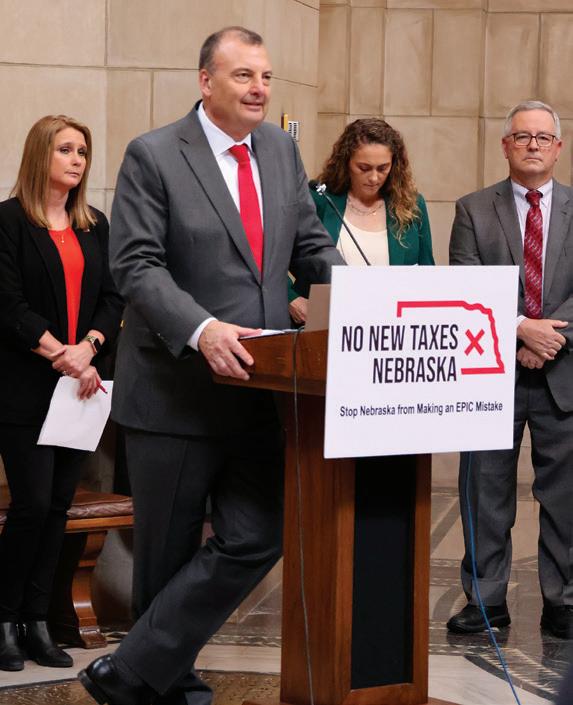

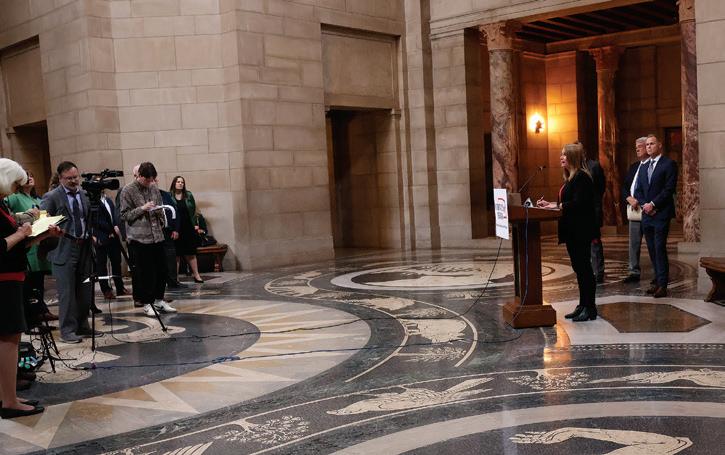
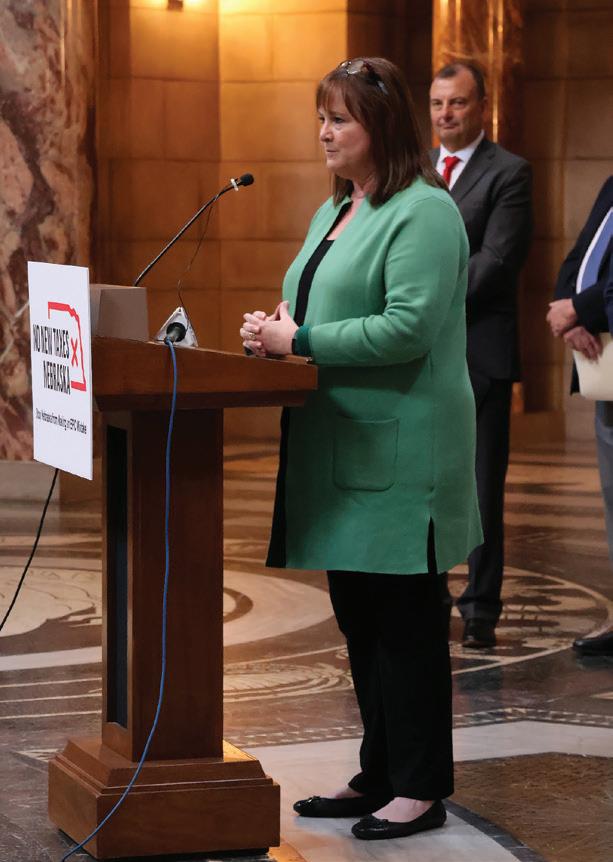







30 NEBRASKA MUNICIPAL REVIEW Financial & Single Audits Budget Consulting & Preparation Retirement Plans Benchmarking & Rate Studies Contact Marcy Luth, Michael Hoback Joe Stump, Kyle Overturf or Tracy Cannon 1203 W. 2nd Street Grand Island, NE 68801 Ph 308.381.1810 Fax 308.381.4824 www.gicpas.com Terry Galloway PO Box 108 | 309 Smith Ave Elwood, NE 68937 www.GallowayFinancialAdvisors.com ENGINEERING ARCHITECTURE CONSTRUCTION FIELD SERVICES Omaha - 402.493.4800 | Lincoln - 402.488.2500 SCHEMMER.COM MUNICIPAL CODE SERVICES, INC. MUNICIPAL CODE REVISION BASIC CODE FOR SMALL VILLAGES UPDATING FOR AMERICAN LEGAL AND OTHER CODES UPDATING FOR ZONING REGULATIONS POLICY MANUALS Personal Service / Nebraska Company P.O. Box 164, Neligh, NE 68756 Phone 402.887.5022 leagle@mcnallylaw.net www.mcodeservices.com PROFESSIONAL DIRECTORY
groups
to EPIC Tax
voice opposition
Photos by Ashley Wolfe, LNM
Hastings Municipal Airport named airport of the year by Nebraska Aeronautics Commission
Recent airport accomplishments include influx of potential pilots earning licenses and bringing a mechanic company which offers a full avionics shop
The Nebraska Aeronautics Commission honored the Hastings Municipal Airport on Thursday, Jan. 25 as Airport of the Year.
Representatives of the Hastings aviation community accepted the award during the Nebraska Aviation Symposium at the Crown Plaza Conference Center in Kearney. The Nebraska Aeronautics Commission is a division of the Nebraska Department of Transportation.
The Airport of the Year designation is open to all airports in the state, regardless of size.
“I know a lot of people have noticed the changes and growth of our airport as well as the increased activity,” Airport Manager Matthew Kuhr said. “I think this award validates that the efforts of the city, city staff and the airport community are being recognized on a larger scale.”
Kuhr was joined at the Nebraska Aviation Symposium by Airport Advisory Board members Jason Haase, Phil Beda, Aaron Schardt and Brent Hoops, as well as Airport Facilities Technician Jim Howsden; and Flight Instructors Dan Spellman and Glen Bredthauer.
Spellman and Bredthauer are also members of the Hastings Experimental Aircraft Association chapter. Bredthauer is also a mechanic for J&S as well as a member of the Nebraska Antique Airplane Association.
On behalf of the Airport, the representatives received signs for the airport, a certificate and a poster to display.
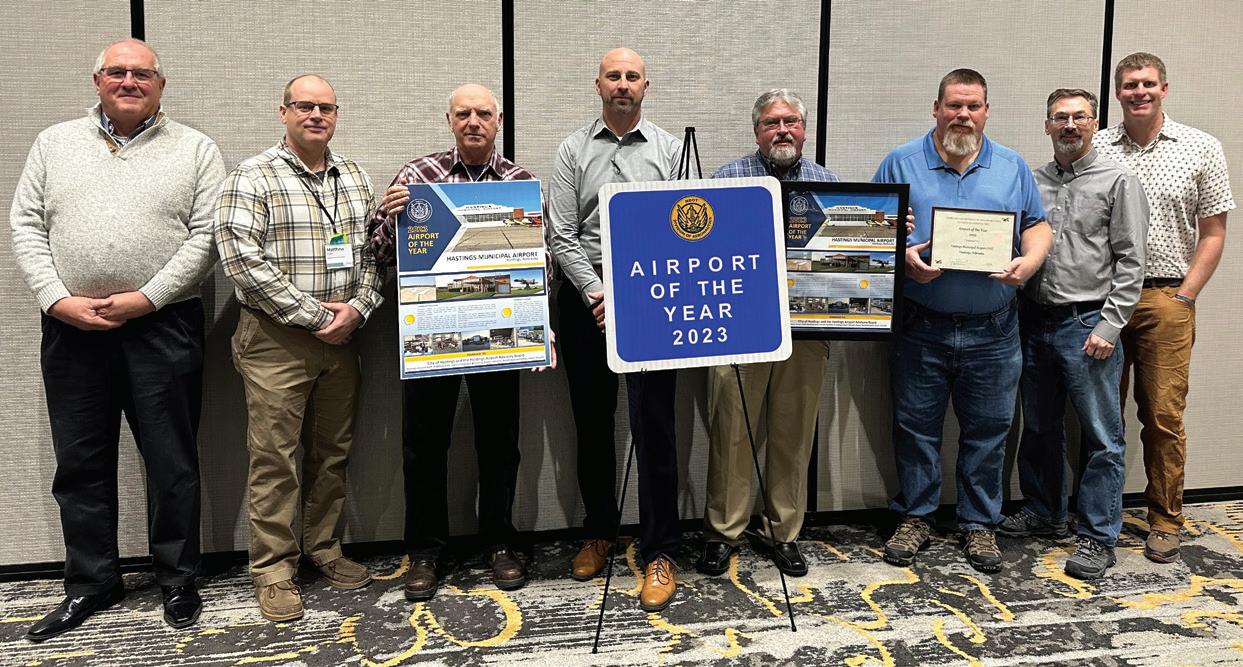
Nebraska Antique Airplane Association. We have an Active EAA chapter. We have an FBO to refuel and take care of the business traffic that come to town. And we have several people that are learning to fly as well as several that have completed their licenses. I think that all of this led to the receiving of this award.
“Aviation is so much more than buying a ticket for an airline. An active airport can help drive economic growth for a city.”
Matthew Kuhr Manager, Hastings Municipal Airport
Kuhr said the city and the aviation community have worked hard over the last few years to create a culture and environment at the airport that is welcoming to everyone that is interested in aviation.
The Hastings Municipal Airport is home to the Nebraska Chapter of the Antique Airplane Association, which hosts a hamburger feed during the last Saturday each month from March to October.
“We work hard to engage and include the local community,” he said. “We have grown. New mechanics and families have moved to town. We are the home of the
Kuhr is excited about the growth.
“Aviation is so much more than buying a ticket for an airline,” he said. “An active airport can help drive economic growth for a city.”
Hastings Municipal Airport sees several medical aircraft each week that help bring in doctors or supplies to Mary Lanning Healthcare, as well as the medical evacuation of people who need care.
The military uses the Hastings Municipal Airport for training and fuel.
Recent accomplishments for Hastings Municipal Airport include an influx of prospective pilots earning licenses and bringing in the mechanic company J&S Aviation, which offers a full avionics shop servicing dash and navigation systems.
Becoming the home of the Antique Aircraft Association and having an active Fixed Base Operator, Hastings Air LLC, has also increased the profile of Hastings Municipal Airport.
“We serve the community in so many ways,” Kuhr said. “We want our airport to be something the city and community can be proud of.”
31 MARCH 2024
Representatives of the Hastings aviation accepted the Airport of the Year award from the Nebraska Aeronautics Commission during the Nebraska Aviation Symposium Jan. 25 in Kearney. Those present included (from left) flight instructor Dan Spellman; Airport Manager Matt Kuhr; Flight instructor and mechanic Glen Bredthauer; Airport Advisory Board member Jason Haase, Airport Facilities Technician Jim Howsden, Airport Advisory Board member Phil Beda, Airport Advisory Board member Aaron Schardt and Airport Advisory Board member Brent Hoops. Photo courtesy of Hastings Air LLC
BURBACH AQUATICS, INC.

Is your pool ready for summer?
Did your pool leak last swim season?
High Water Bill?
Excessive Chemical Use?
Dropping Water Levels?
Then you need to give Burbach Aquatics, Inc. a call.
Pool leaks are problematic and ignoring them creates much bigger problems. Especially when water is being purchased, treated, and heated, the financial loss increases rapidly.
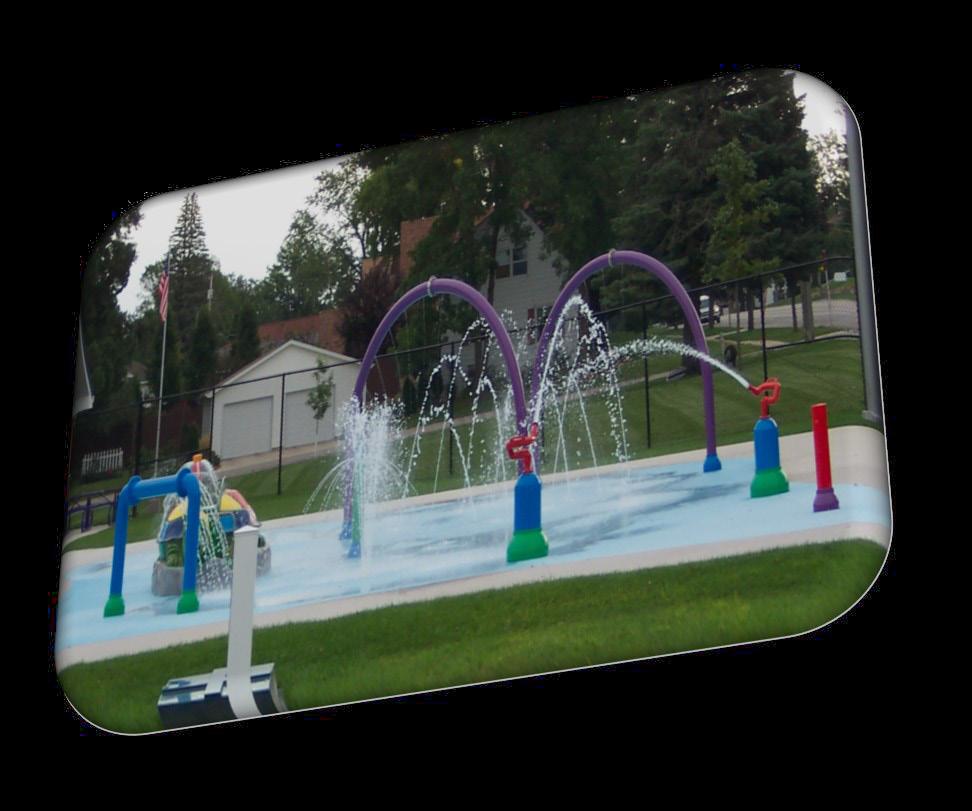



32 NEBRASKA MUNICIPAL REVIEW burbachaquatics.com Burbach Aquatics, Inc. 5974 State Highway 80 South Platteville, Wisconsin 53818 Phone: 608-348-3262 Fax: 608-348-4970 Email: Support@Burbachinc.com
PROVEN RELIABILITY IN AQUATIC DESIGN FOR OVER 45 YEARS!!
© 2024 BURBACH AQUATICS, INC.
































 Director,
Director,






















 BY SEC. OF STATE BOB EVNEN
BY SEC. OF STATE BOB EVNEN













 DAVE BOS EXECUTIVE DIRECTOR, LARM
DAVE BOS EXECUTIVE DIRECTOR, LARM





















